#(also sorry for using british - blame the americans for thinking we’re all english)
Explore tagged Tumblr posts
Text
that new thing where usamericans have started using more cockney adjacent accents to imitate british ppl they don’t like is kinda… idk it feels off,, esp when they’re using slang that’s attributed more to working class people. like what happened to making fun of posh people 🤨 i promise you boris johnson and jk rowling are not the ones saying bruv or innit
#also you lot are totally fine making fun of foods like beans on toast#but i saw that poll where cucumber sandwiches got the most votes for ‘which of these british foods would you eat if you had to’ or smthn#(other than cucumber sandwiches being disgusting they’re very much associated w the upper class)#i’m not accepting the excuse ‘but they all sound the same!’ anymore#if you want to get upset at british people being unknowingly classist you need to educate yourselves as well#this isn’t excusing ppl classist towards usamericans btw im well aware they exist and they suck#(also sorry for using british - blame the americans for thinking we’re all english)
11 notes
·
View notes
Text
i love how anytime the Scots talk about independence the English ALWAYS have to bring up the empire as if we didn’t want independence then… we did. Even in the empire when there were scots involved along with Irish and Welshmen, we were all still being treated horrifically, the soldiers who were involved were used as almost “scare troops”, in other words they sent them in first as a scare tactic and almost always the death toll was higher in the Scottish, Irish and Welsh soldiers. If we look outside of the people involved, the civilians were getting screwed over so bad, the highland clearances, the lowland clearances, Culloden, the fact that their culture was being destroyed and some even consider it a genocide. As a result of this a lot of Scots were forced to move over to places like, North Carolina where they lived with the native Americans (surprisingly they actually married and lived peacefully, mostly) and this was because they actually had a lot of similarities in the way they lived and were treated. There was even a saying “a savage to another savage” which is horrific for both sides. Furthermore, those who were in the British army were considered “traitors” by their own families.
So, although it isn’t widely known about the horrors that occurred within Britain, they very much happened and still affect the countries today and they really weren’t “not that deep”, they were horrific HOWEVER that does not mean Scottish people are ignoring their countries involvement in the British empire ofc, Scotland was involved, there’s a reason why it’s the British empire, but it was very much a Anglo-centric empire and union, hence the reason why half the world speaks English and not Scottish Gaelic or Welsh etc yk?.
In short, dear English people, please everytime we mention our independence don’t think we are disregarding our involvement and stop pretending like we’re blaming it ALL on you lot but also stop pretending like you’re innocent because I promise you’re not, not gonna lie, Scottish, Welsh and Irish people have the right to not like you so stop pretending like we don’t (not all of you ofc). Independence has been a dream since the union was formed and the want for it is still alive today.
sorry i needed to rant becuase people on TikTok are ATTACKING me and I can’t comment long comments on there :))
#scottish independence#scotland#british empire#britain#scotland forever#irish history#united ireland#ireland#wales#welsh independence#welsh history
26 notes
·
View notes
Text
pinky and the brain - s1e6: brainania

i’m running on like the barest dregs of energy let’s fucking do this leeroy jenkins
episode summary: brain needs to build a Very Big Tumbly Drier. he needs a lot of money to build a Very Big Tumbly Drier. he decides the best way to do this is to.... invent a country and scam the us out of a foreign aid cheque.
hm.
the rundown:
it’s acme labs!
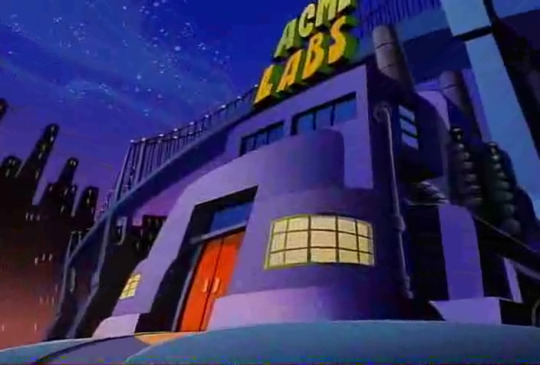
there it is.
as we zoom in a little, we hear pinky laughing maniacally at the very mention of tom ruegger, while a couple of women are dead on the floor.

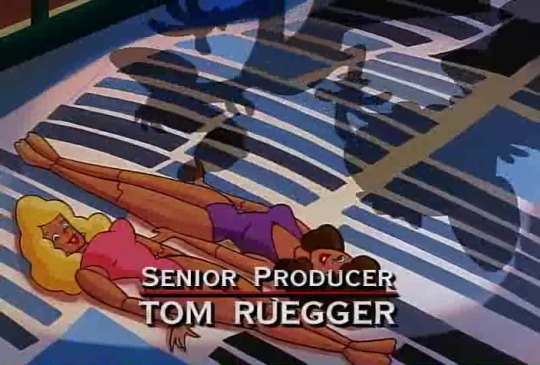
hm.
SPEAK TO ME, PHYLLIS, SPEAK. as it turns out, things aren’t quite as dire as previously thought, as pinky affirms that brain looks “simply fetching.”

narf.
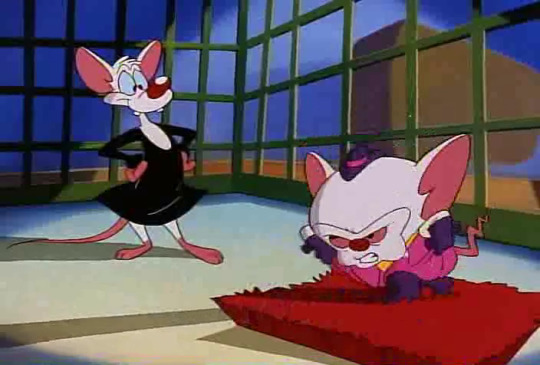
“these are the only garments i could obtain. and besides, you are no helen of troy yourself.”
ignoring the fact that he chose to wear the hat and the gloves as well, brain moves onto explaining his latest plan--
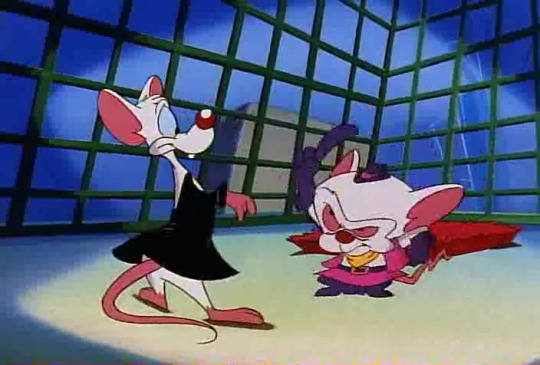

but not before giving pinky a static-y poke for his crimes.
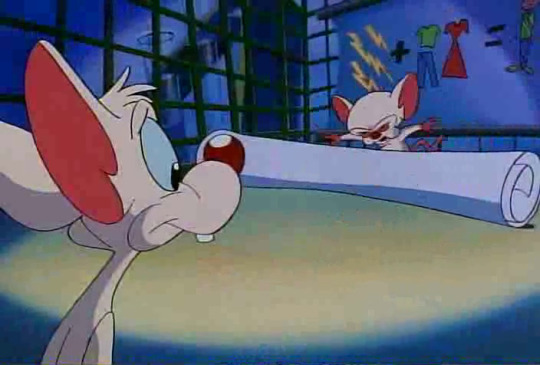
“to generate global static cling, we shall construct a massive clothes dryer.”
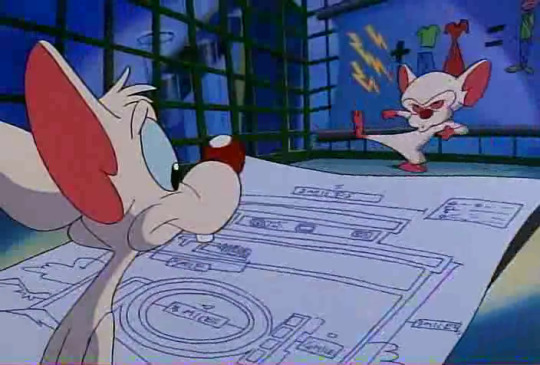
BEHOLD.

THE TITANOCYCLE FOUR THOUSAND, WITH THREE SPEEDS AND AUTOMATIC WRINKLEGUARD. this will surely allow brain to.... trap everyone in their clothes via static cling and. uh. allow him to seize power...... somehow......... by putting everyone in a really big tumbledryer?????

it costs fourteen billion dollars.
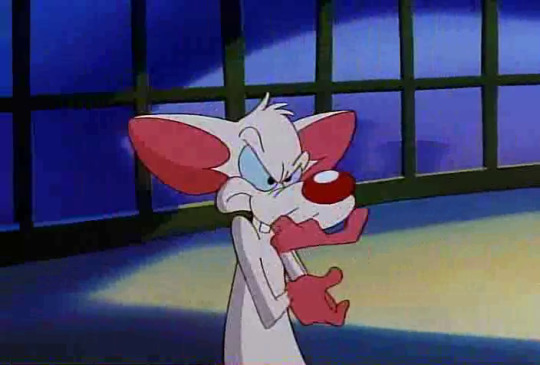
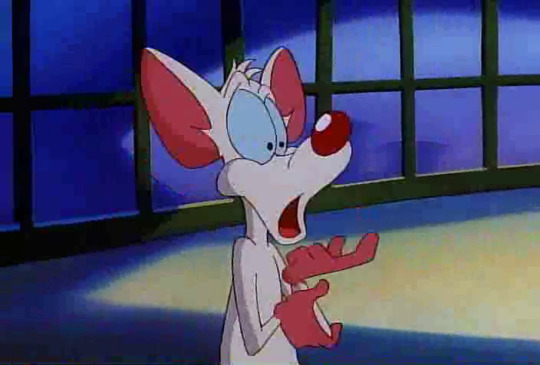
“oh, i have it!”

“we build a huge tooth, leave it under a huge pillow, and then fairies will leave us lots of money!”
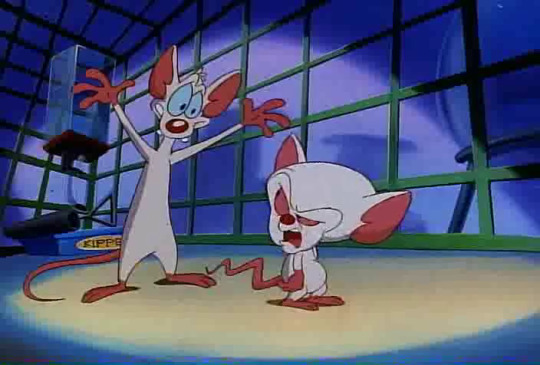
brain tells pinky to stop eating paint chips. it’s a well deserved response to pinky’s insane, bullshit idea, not nearly as dignified and scientific as Everyone Goes In The Big Tumbly Dryer By Brain Age Two And A Half.
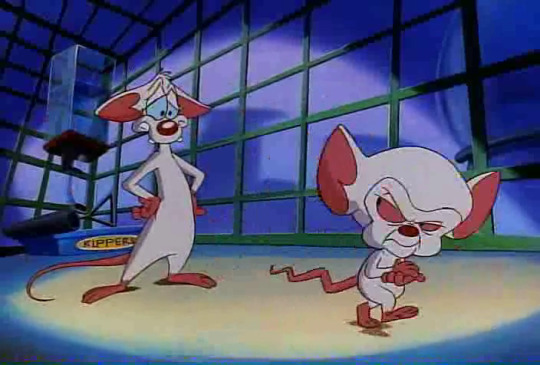
as he heads off to ponder an Equally Sensible idea to get a lot of money, pinky assures brain that he will not “be a bother.”
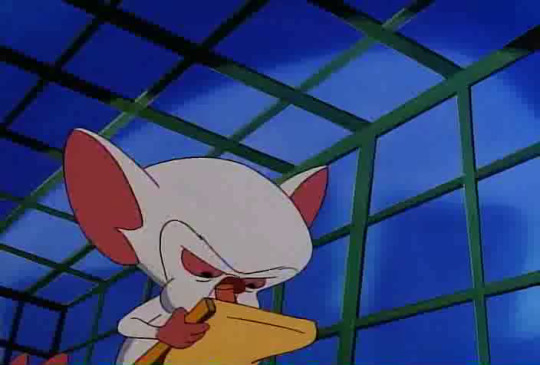
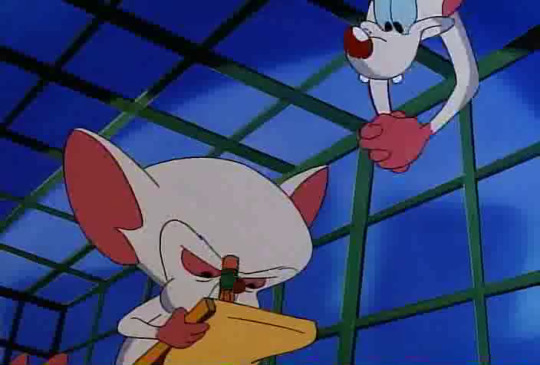
“brain.”
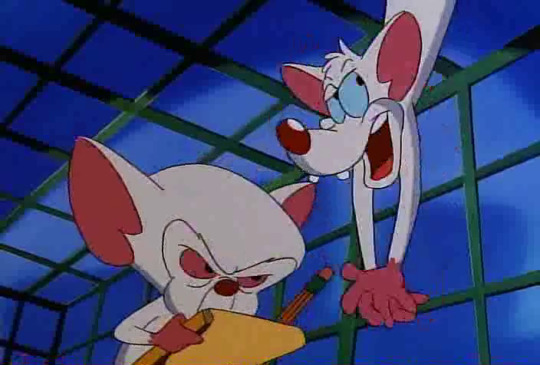
“if i ate a hundred jelly rolls, would i explode?”

i don’t know why pinky is sticking his ass out. maybe that’s where the jelly rolls go, in the sense that whenever i used to eat cakes around my dad he’d often say something like “a minute on the lips is a lifetime on the hips”. (also? pinky is british, so what he actually means is jelly rolls, and that sounds disgusting.)
so anyway brain gives him a piece of paper and tells him to try origami.
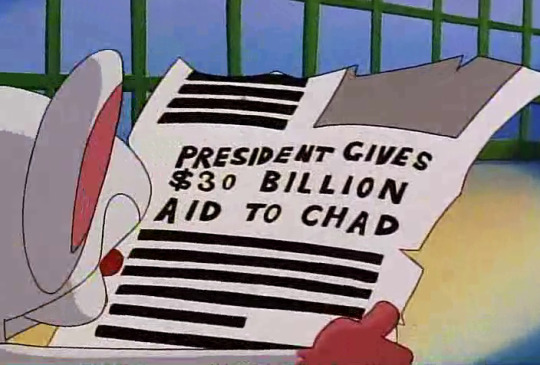
BUT WAIT.

“pinky! are you pondering what i’m pondering?” “i think so brain, but why the bitch stacey foreign aid office is giving chad all the money while i’ve always been a nice guy and showed her a basic level of human respect is beyond me. narf.”
no i’m sorry. he didn’t say that. pinky respects women. also apologies to the residents of the actual country of chad. big ups to all of you. lol. (he actually says “but pantyhose are so uncomfortable in the summertime”, which is wild, considering this episode was aired in november.)
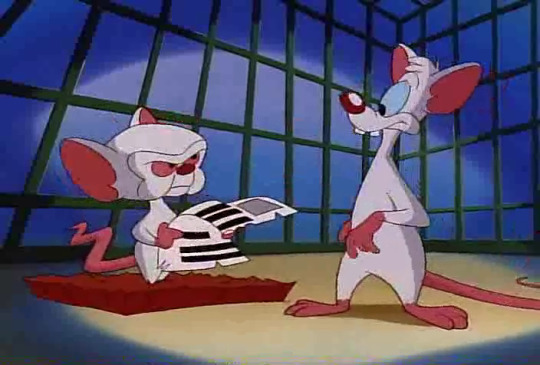
brain doesn’t want to wear the pantyhose.
well, maybe he does, but not right now. instead, he suggests that they form a bogus nation and demand reparations from the united states, which is, of course, easier, saner, and far less work than Really Big Tooth. as he folds the Chad Newspaper into a vague key shape (the Virgin Tabloid never had a chance) pinky points out that, uh

you can’t just invent a country, brain. “won’t people know we’re not a real country?”
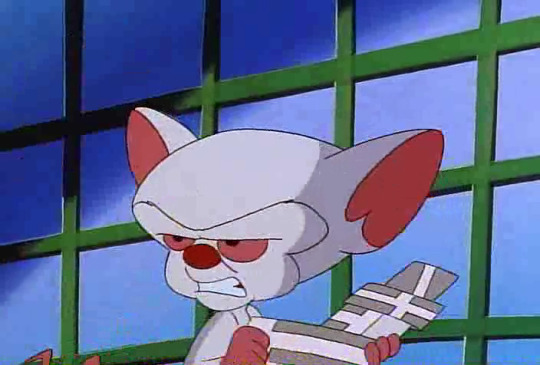
“the average american’s grasp of geography is pitiful. they’ll think we’re part of the former soviet union.”
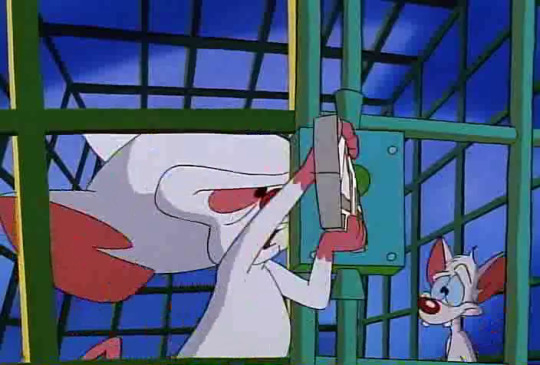
“or canada.”

so they pick a random, tiny island on the label of a Science Chemical and set off on the boat to Being A Coloniser Town.

a long sea voyage awaits us! and at the end, we shall found a nation! and that nation shall be called!
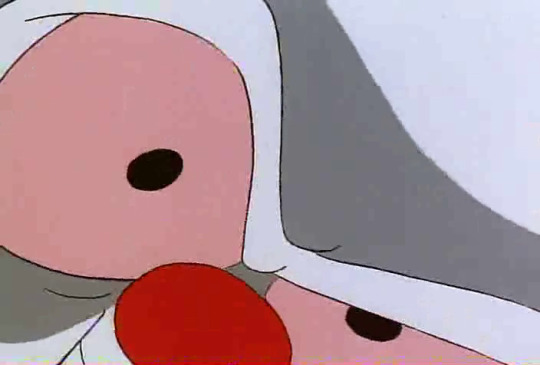
BRAINANIA.
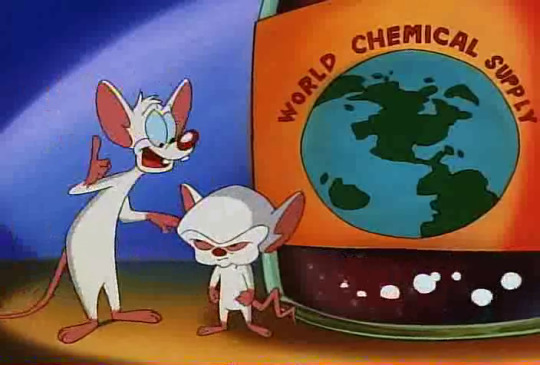
“can’t we call it pinkyland? or eric?”
“don’t vex me, pinky, or i shall turn on you.”

so they get on the S.S FATTY LUMPKIN and bugger off to Island X.
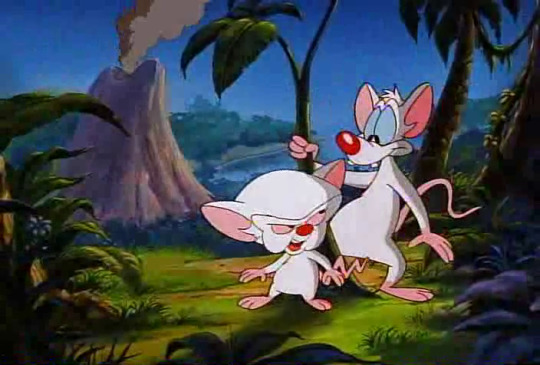
“i haven’t seen anybody yet, brain. i guess we’re alone here.”
“excellent, pinky. it’s time to flesh out the terrain.”
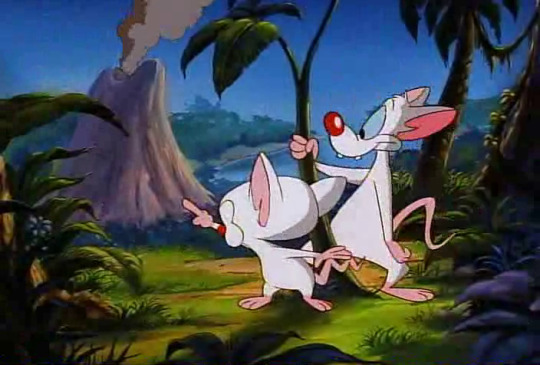
“that volcano will be mount brain.”*

“this clearing will be brain flats,”
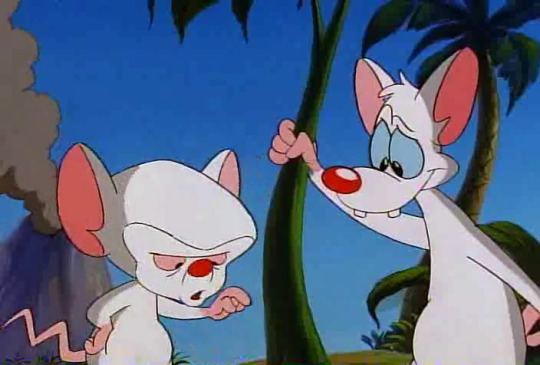
“and that water over there--”

“very well.”
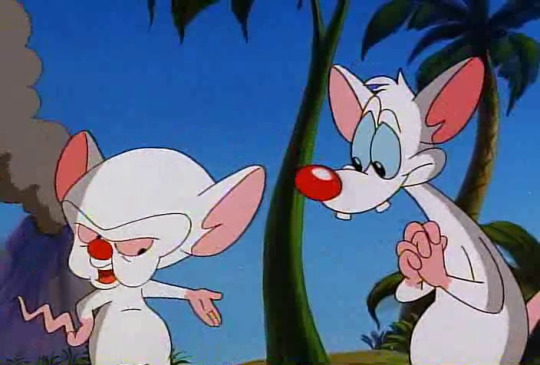
“the fjord of pinky.”

and they hoist their adorable, homemade flag, while pinky doots them a little themetune.
(*perhaps when they’re not in the middle of the jungle.)

how lovely!

less lovely.
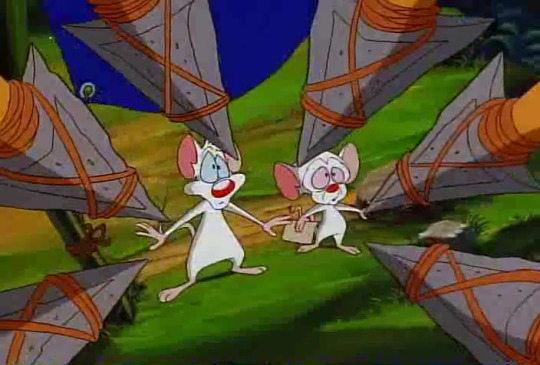
significantly less lovely. still, it got brain to make the little O:O face, so it’s not all bad.
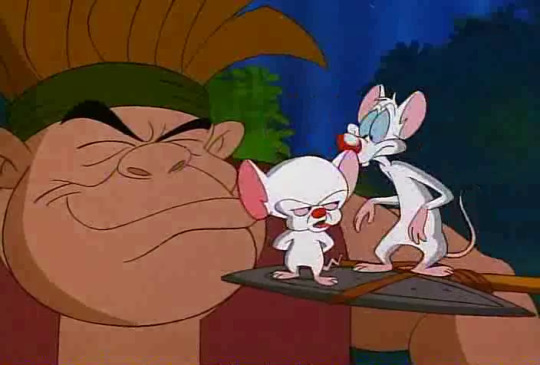
as the mice are scooped up onto a sphere and presented in front of this presumably-maori gentleman, brain decides to put his White Gay From Los Angeles skills to the test, and reassures pinky that he will communicate with them in the Primitive Argot Of The South Seas.

ME NUMBER ONE FELLA. OTHER FELLA NUMBER TEN. CATCHY ALL SAME SAME. YOU SAVVY?
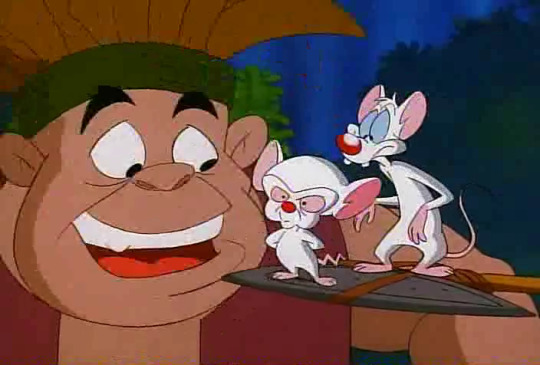
“good day, mate. d’you speak english?”
hmmmmmmmmmmmmmmmmmmmmmmmm.
anyway apparently this has happened often enough that these guys learnt english. from all the times it happened. and then they ate the guy they learnt english from and shrunk his head, but to be honest, i don’t blame them.
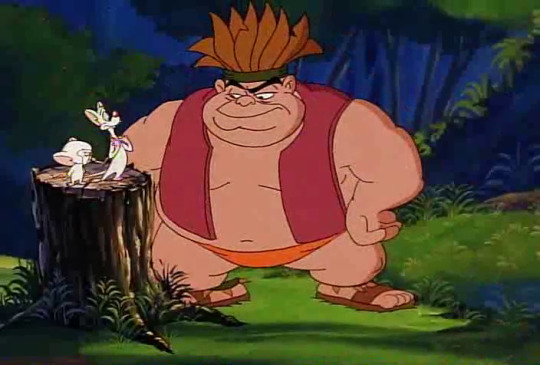
this is alan. “hello, alan.” says pinky.
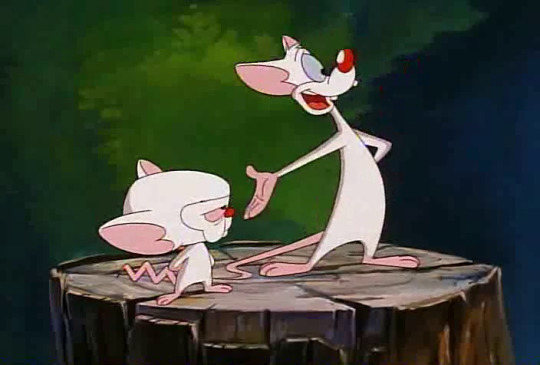
“i would be pinky! and this is prime minister brain.”
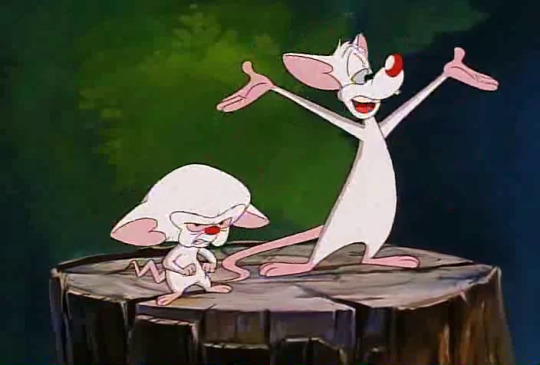
“who is IN CHARGE OF THIS ISLAND AND EVERYTHING YOU SEEEE.”
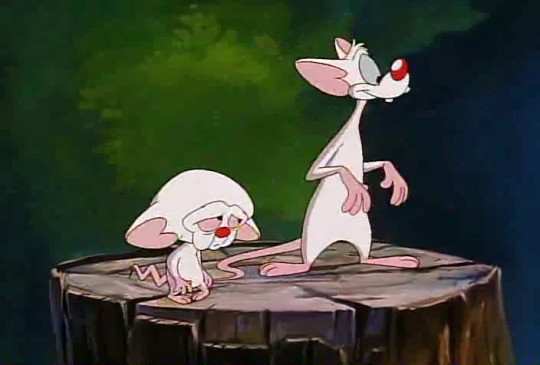
“narf.”
sneaky bastard knows what he’s doing.

alan isn’t too happy with that, because the island belongs to the volcano god, whanganui,
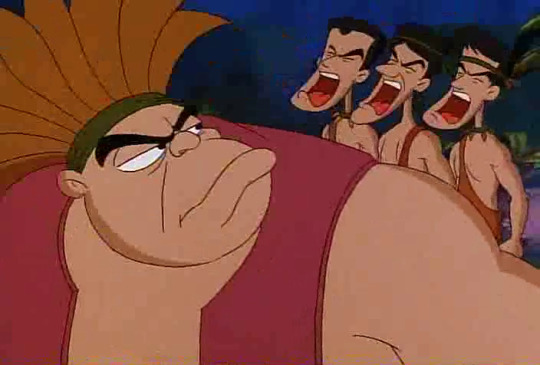
WHO PROTECTS US FROM EVIL AND HAAARM AND WHAT ALL ELSE.
(i can find no evidence that whanganui is actually a god, as opposed to just A Bit Of New Zealand. if they are, i’m more than happy to go back and edit this as would be religiously considerate.)
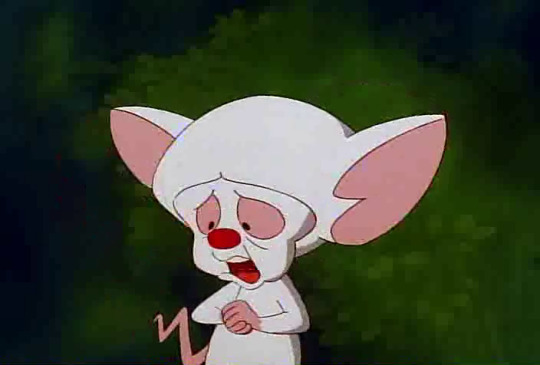
this is the face of a man who knows he has fucked up.
still, brain decides yet again that his pride comes before any kind of rational decision, so he decides to tell them that whanganui sent him to the island to rule over them,

as proven by his fire powers.
(ETA: i missed this last time. why is brain carrying a lighter around? that episode isn’t for a good few more seasons yet.)

alan is unimpressed.
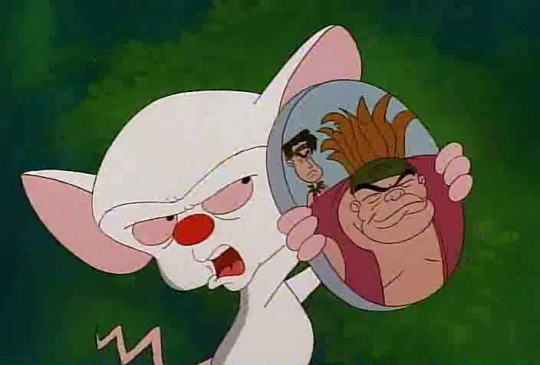
I CAN TRAP YOUR SOULS INSIDE THIS GLASS

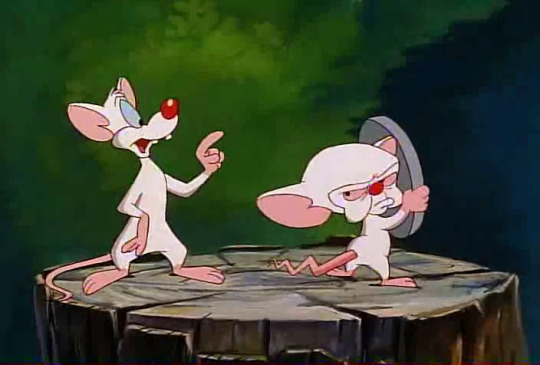
“i can make bubbles with my spit!”


apparently this is a real talent on the island. who’d have thought. (they do not believe it to be a sign of god. it’s just really cool.)
so brain gets a hand building brainania.
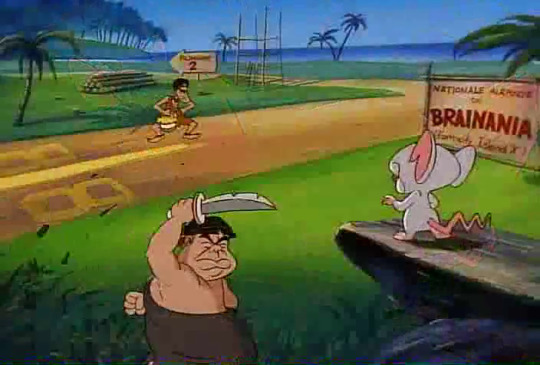
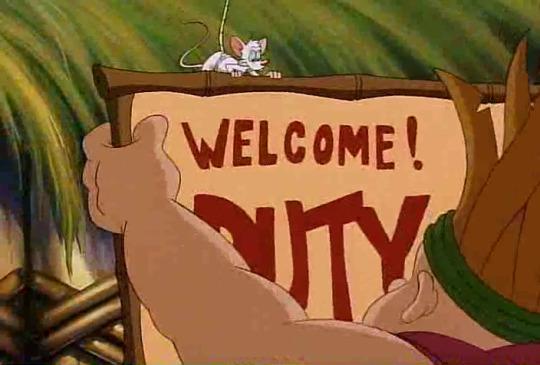

it has everything one could possibly need.
actually pretty much as soon as the airport and the gift shop are built, brain heads to washington, so evidently he holds the strong opinion that this is everything a country could possibly need. odd. still, maybe he plans on adding stuff once he becomes world ruler, or whatever.

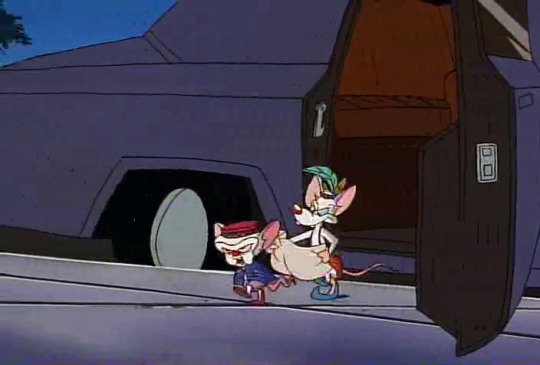
so with that established, The Most Exalted ned limpopo gets out of the car. hassan lembeck is also here. he is attempting to make an origami bird out of a newspaper.


no bird for you, mr lembeck. no bird for you.
they wander off to go and see mr bisck, who is currently playing with a little toy plane.

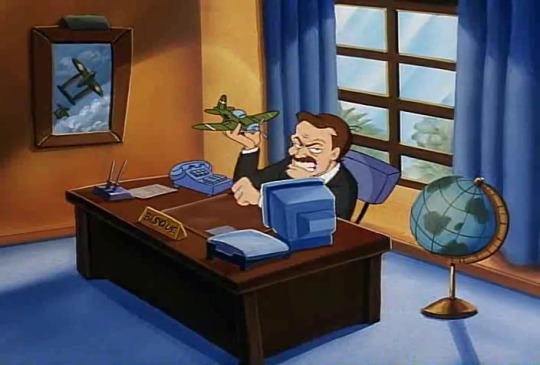
he reacts to the news that the prime minister of brainania is here to see him with “oh great, more moochers,”
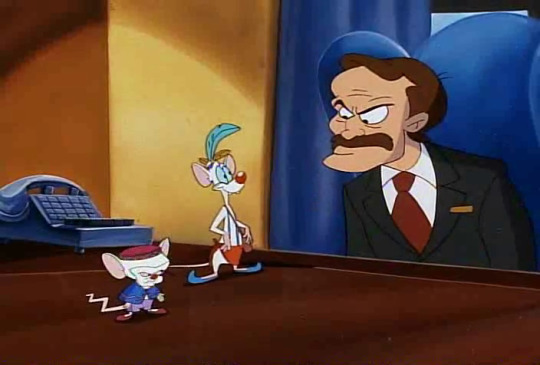
and does not seem to take kindly to having tiny mice on his desk, even if they are reasonably exalted.
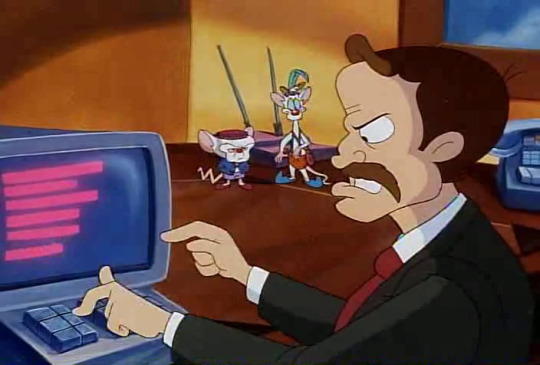
though a quick database search tells him said mice have no record of financial trouble, or, indeed, a credit rating, so. he tells them to go away.
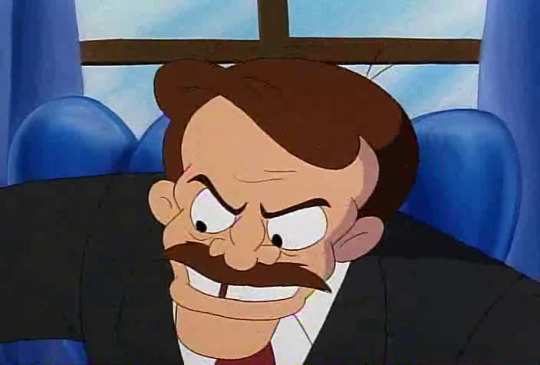
“go away.”
okay. hassan doesn’t take this well.
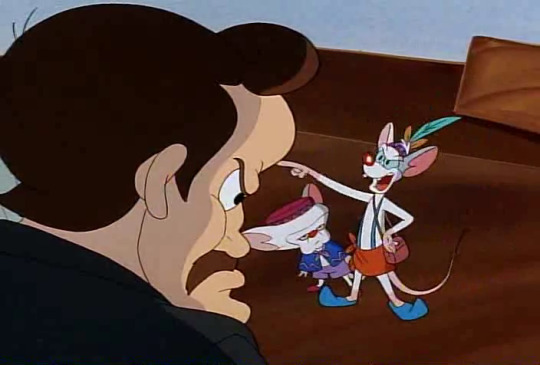
as Exalted Ned Limpopo gently tries to persuade mr bisck that he could “harm negotations” between brainania and the us (a lot more politely than he usually explains things to people, may i add) hassan chimes in with a haven’t you people ever heard of bold claim that brainania, if slighted, will INVADE YOUR LANDS

GO BOOM BOOM BOOM

AND MAKE YOU ALL OUR PATHETIC SLAAAAAAAAAAAAVES.
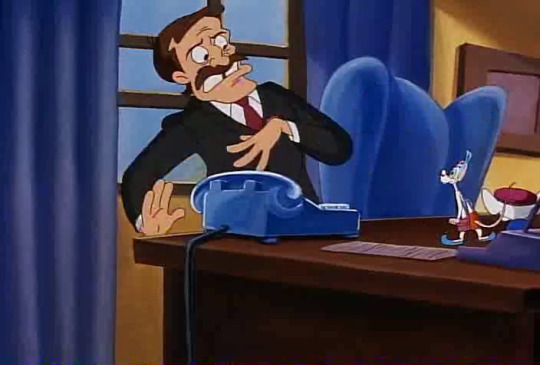
mr bisck does not like this idea, it seems.
as he rushes off to tell the UN, brain informs pinky that he has

“just created an international incident.”
“oh, thank you, brain.”
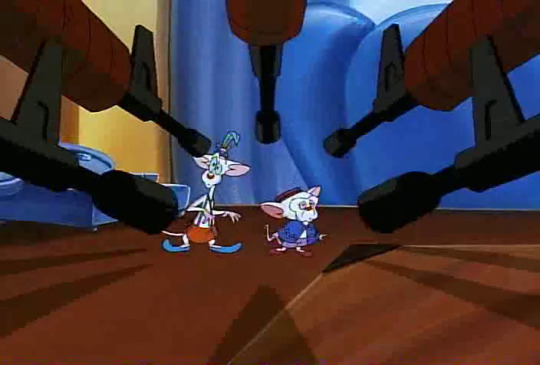
“in the words of the immortal yogi bear, this is dejavu all over again.”
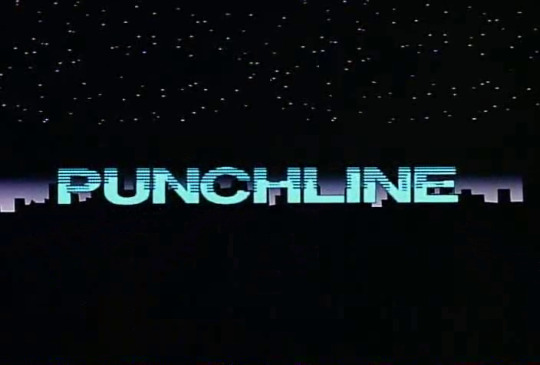
so the boys turn up on PUNCHLINE, WITH FRED FLUBBLE.
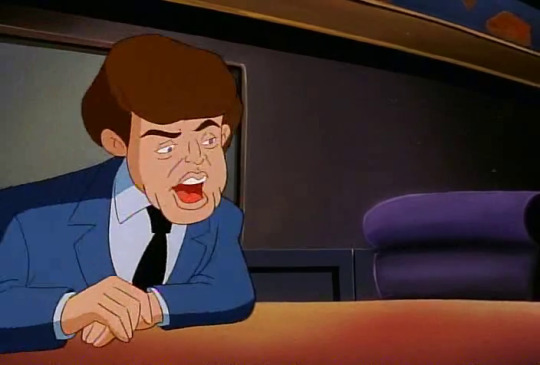
there he is. “perhaps you gentlemen would care to climb up on the desk?”

they make it, just about.

and sing a fun little song about brainania’s war victories, i guess.
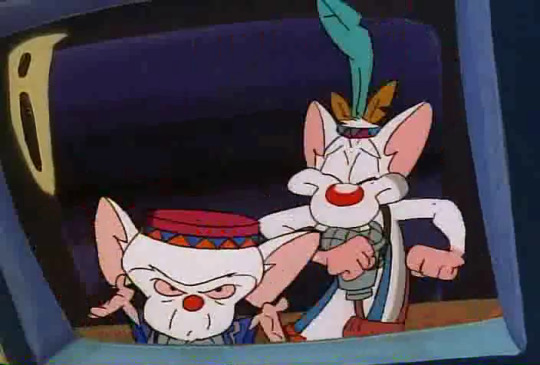
WE WILL FIGHT AND NEVER QUIT
FIND ME A ROOFTOP AND I WILL SPIT. NARF
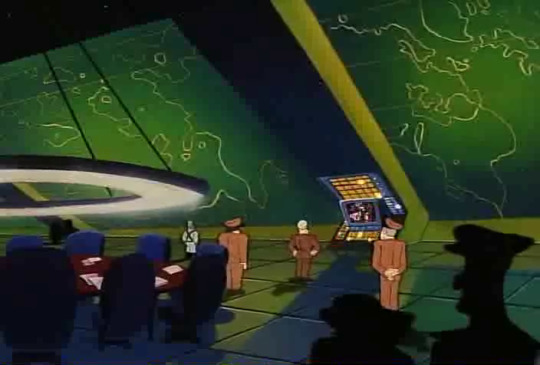
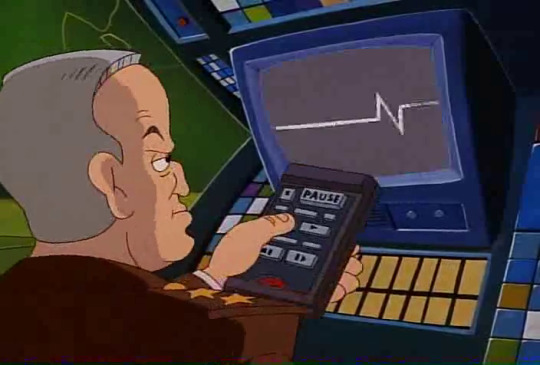
this is not well recieved by the us military.

unfortunately, as the US press secretary points out, the us cannot go to war with a country it can’t find,
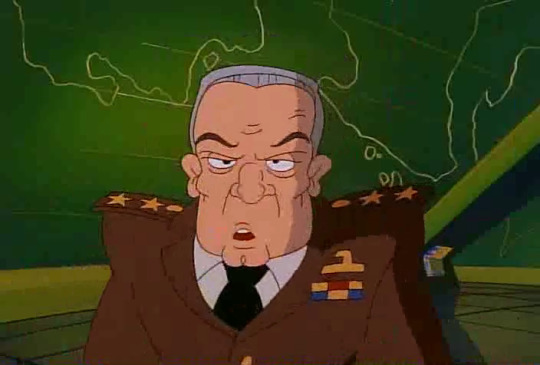
(wuss.)

so instead the mice are invited to dinner at the white house.

“in a few short hours, pinky, we shall have our foreign aid loan, and then the world!”
“birdy birdy birdy! narf!”
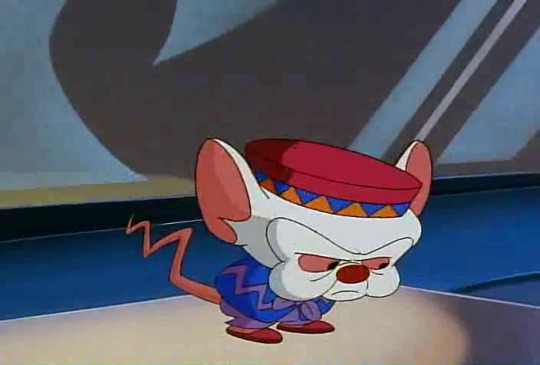
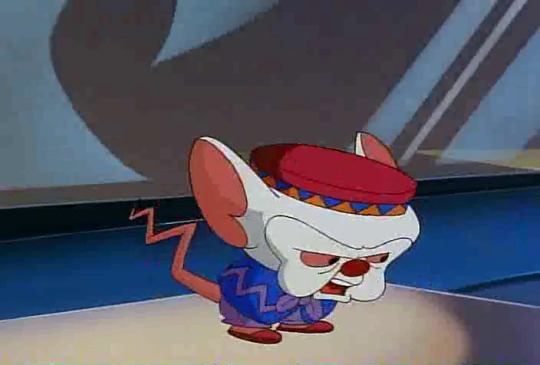
“i sense much of this historic moment is lost on you.”

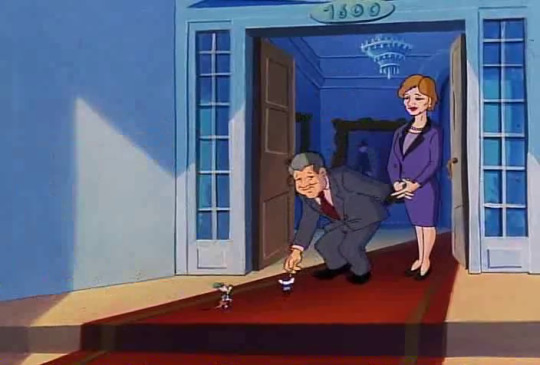
at the white house, a very bored looking individual introduces The Most Exalted Ned Limpopo (feat. hassan lembeck), and bill clinton shakes his hand.
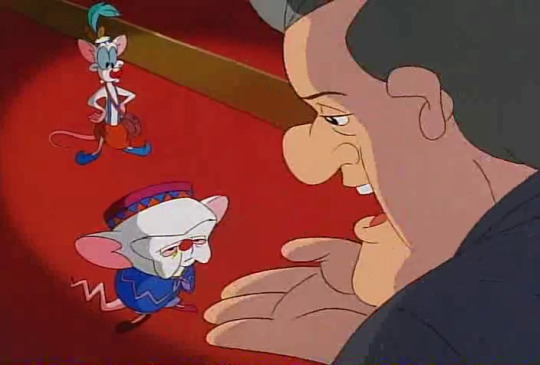
“me number one fella. other fellas number ten. catchy all same same. you savvy?”
“i speak fluent english.”
“eyyyy. haha. sure you do.”
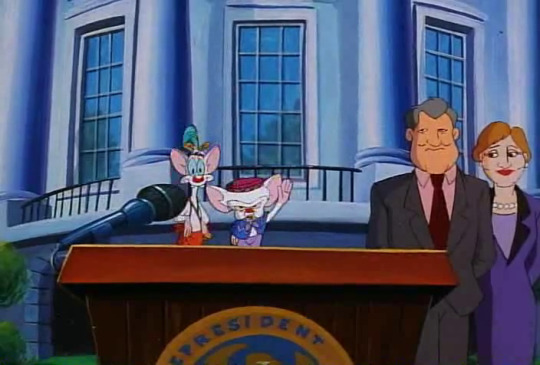
“all brainania ever wanted from the US was friendship. friendship, and fourteen billion dollars and fifty nine cents. the friendship i will treasure. the money i will spend on polo ponies and cruise missiles.”
brain has a brief discussion with hilary clinton over the advantages of strontium ninety versus uranium two-thirty-eight,
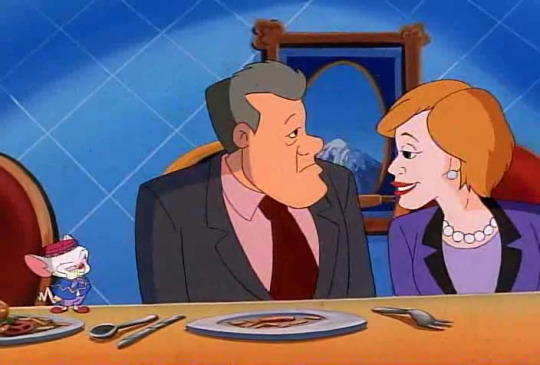
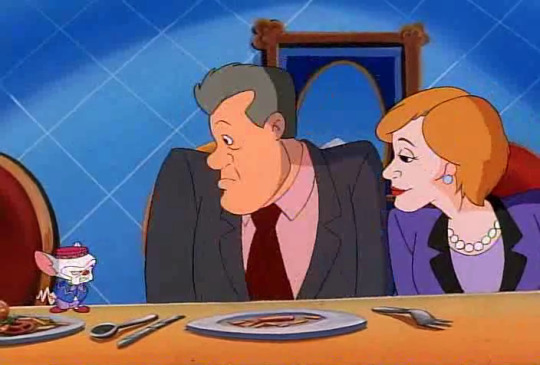

bill clinton pulls this face and tells them it Sounds Smart,
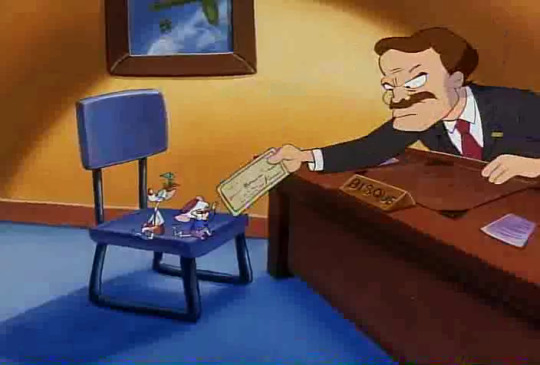
and the mice bounce merrily back to mr bisck to get their foreign aid check.
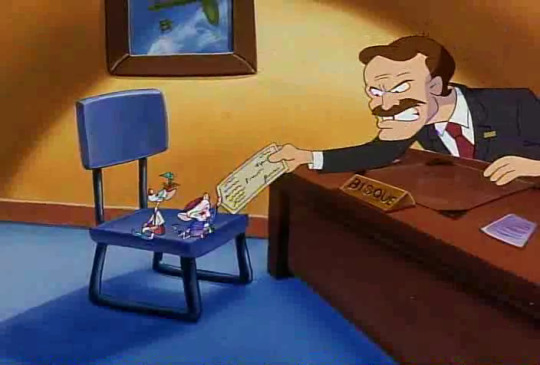
“you better not lose it, buster!!! i just erased your records!! you won’t get another one from me!!!!”
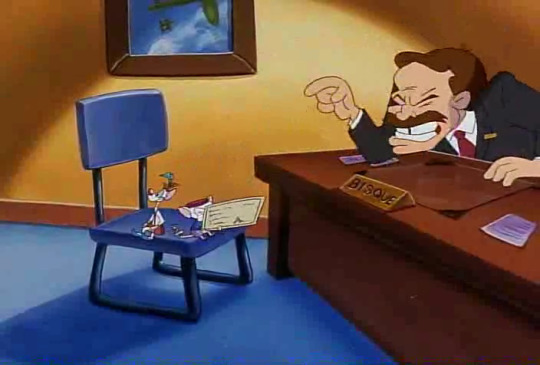
HA.
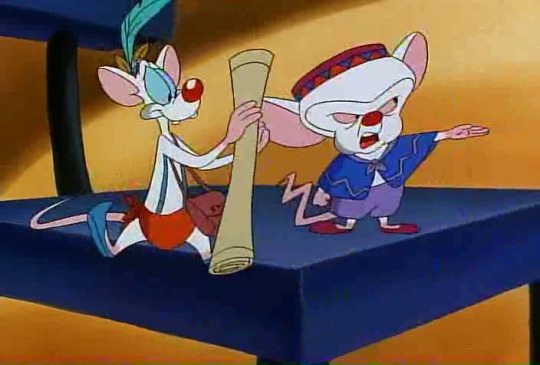
“one should be enough. thanks and farewell, “

“you niggling bureaucrat.”
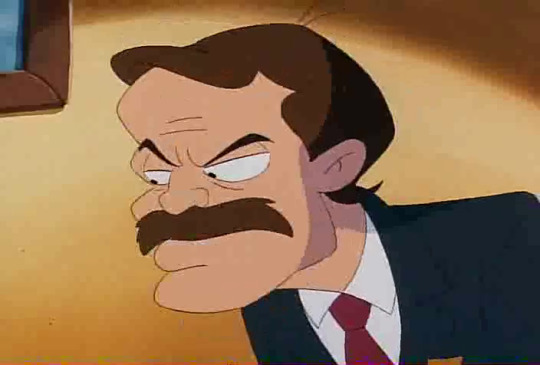
conclusion:

upon returning back to brainania, The Most Exalted Ned Limpopo finds a letter from alan addressed to him. it’s also mouse sized, which is adorable. apparently, whanganui,
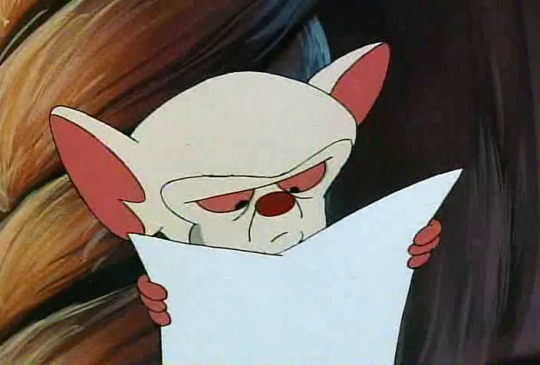
WHO PROTECTS US FROM EVIL AND WHAT ALL ELSE

is “blinking mad”, and the volcano is going to explode.
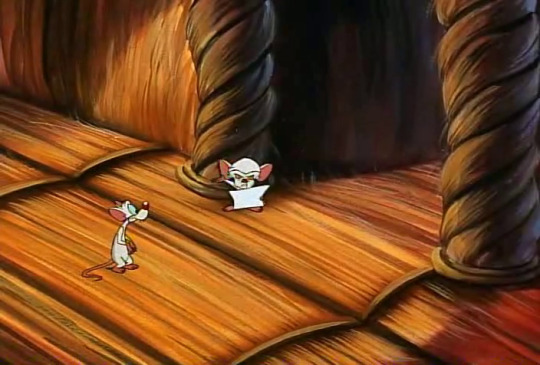
brain, obviously, does not believe in whanganui, and is mostly just mad that he’s lost his workforce. still, as pinky points out,

“at least we've still got brainania!”
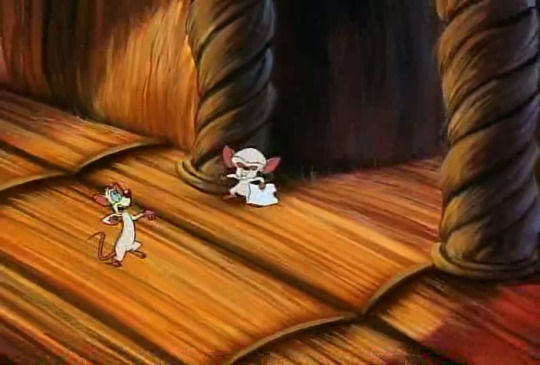


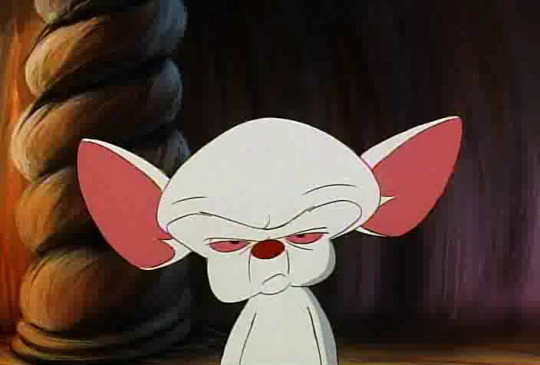
“i sense life has taken another sardonic twist.”
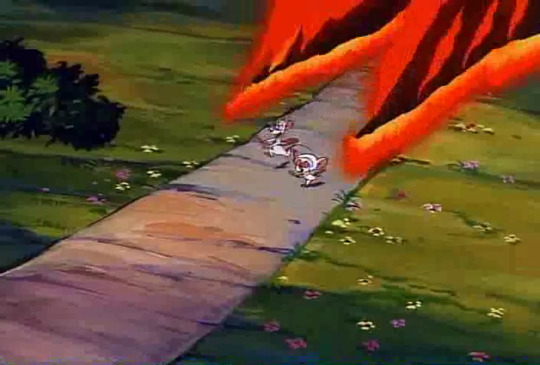

still, they do, barely, have enough time to reach the shoreline and start swimming away from the imminently exploding volcano. perhaps it should have been, yknow, a pretty decent sign that the natives cleared out. historically, people who live in these places tend to know about them, but what of that when brain is number one guy same same you savvy.
🙄
anyway the karmatic response to all of that previous racism is that a tidal wave sweeps them back onto the volcano,


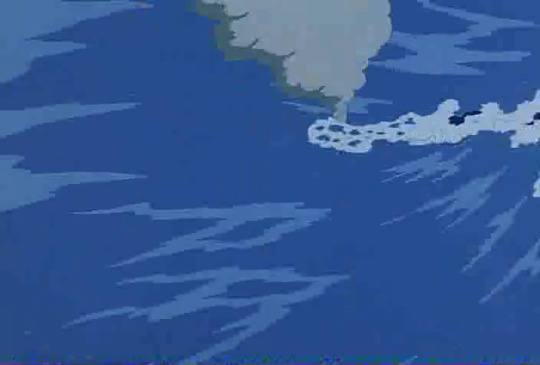
which then blasts them into space.


(okay not literally space. but they do end up on a little raft in the middle of the ocean. don’t ask me where the raft came from. i have no idea.)

oof.
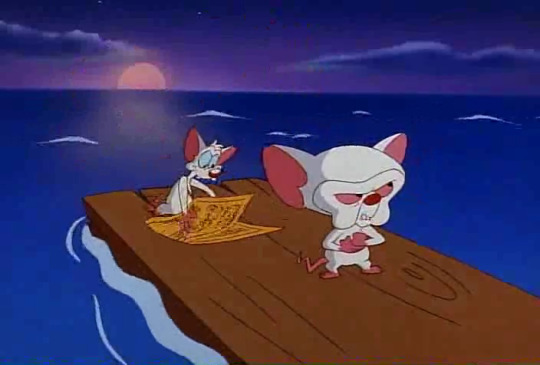
“mother nature has slammed her unmerciful fist on our fair isle, pinky.”
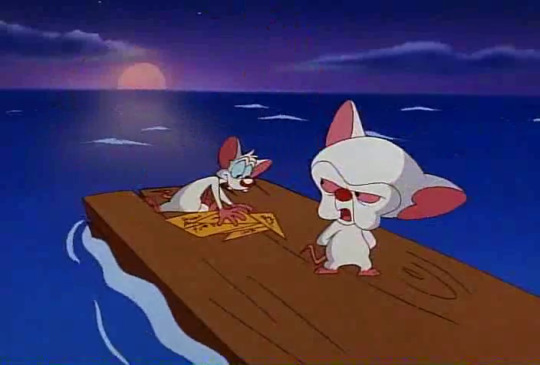
“do you know what this means?”
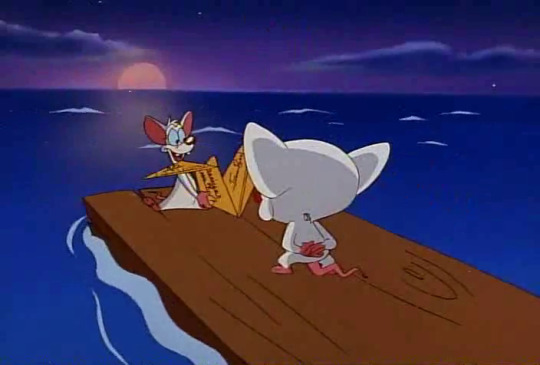
“birdy birdy birdy!!!!”
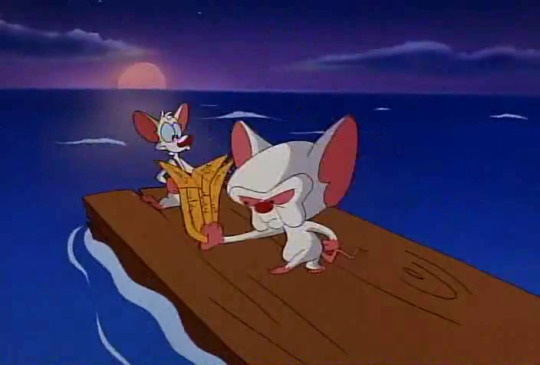
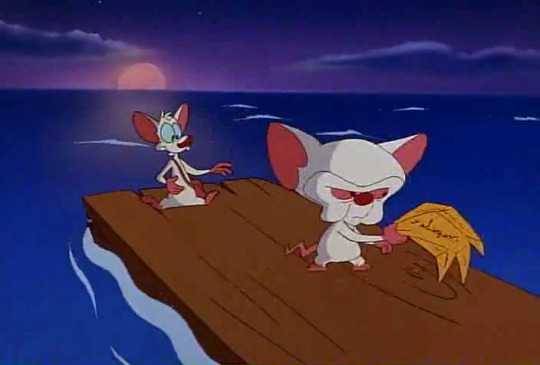
brain does not appreciate Birdy Birdy Birdy.

“blast it, pinky!”
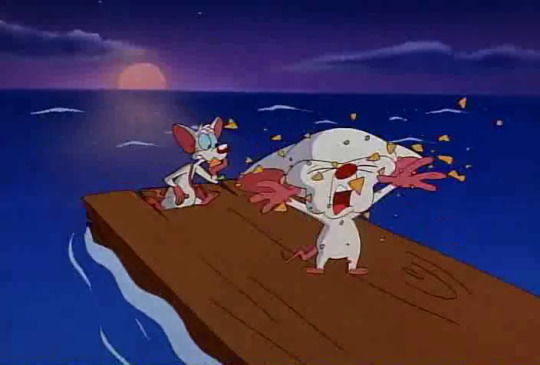
“i said, do you know what this means!!”

“it means you just ripped up our foreign aid cheque.”


one should be enough, huh?
brain: 7 pinky: 7 outside influence: 13
like, i don’t know. maybe pinky shouldn’t have been making oragami birds out of the foreign aid cheque. but, while silly, it’s not like it did any harm. brain.... brain just needs to chill.
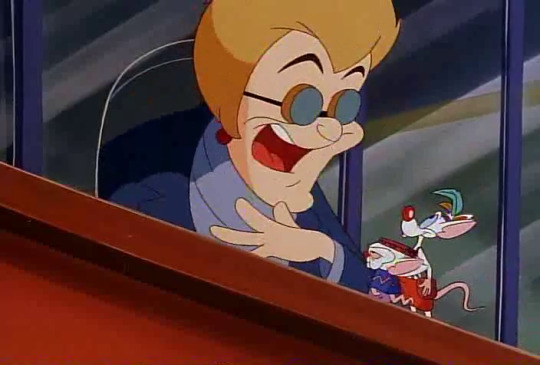
“well, aren’t you the tiniest foreigners i’ve had in here all morning. i’m mr appleby, can i help you?”

“yes. we would like to have relations with you. and steal some milk duds.”
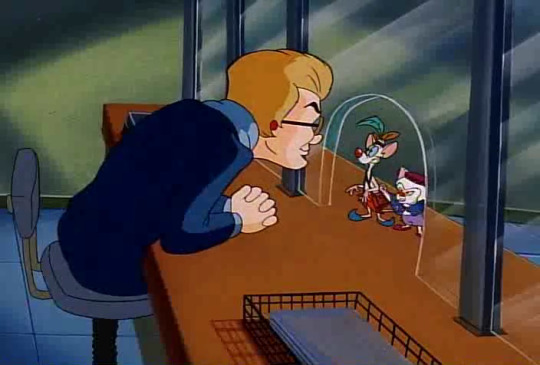
“we wish to establish diplomatic relations with the us. i am the prime minister, and this is my minister of finance.”
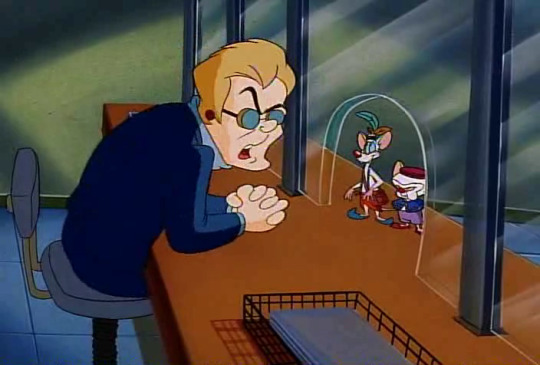
“brainania--? oh, i remember you. you used to be a.... suburb of prague.”
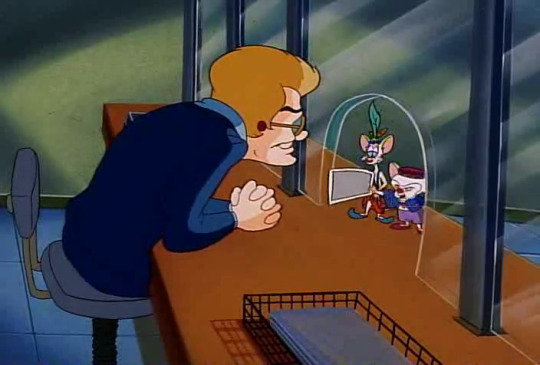
“can you prove you’re a nation?”
“yes! we have postcards.”
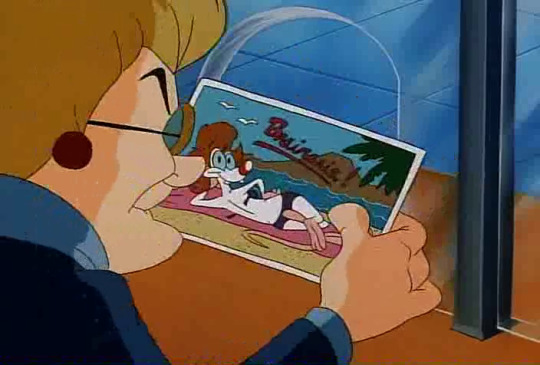

“that’s the fjord of pinky.”
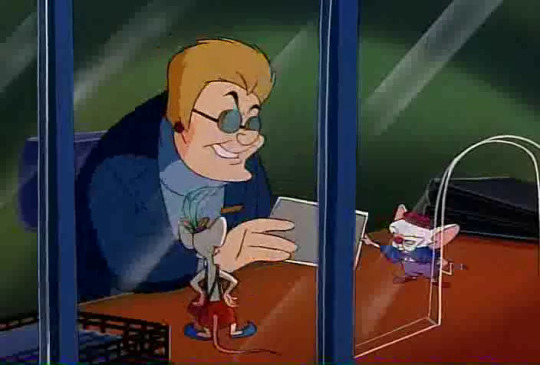
“you foreign folk sure have your own.... queer little ways.”
#patb#pinky and the brain#i did not like this episose much but. i suppose it was like thirty years ago#bizarrely it's actually more respectful to the natives than a lot of cartoons at the time were which is#even worse actually.
30 notes
·
View notes
Text
An Odd Family Tree
A series of snippets from the lives of the FitzSimmons family, set post 7x13. Also, the series of events that lead up to the birth of their grandson.
Available to read on AO3 and FF.net.
Comments make my day!
Chapter 23: Accent
Alya had been given a very high position as one of the head researchers at Manchester University, and Owen had (somehow) managed to be put in charge of a climbing centre. Since both of them had pretty demanding jobs, Alya moreso, it was impossible for them to leave their house for more than an overnight trip.
That made visiting either set of grandparents a problem.
Luckily for Alya, her parents were relatively close enough to visit them instead.
Jemma rang the doorbell, and it only took a few seconds before a tiny muffled voice could be heard from inside.
“Ding dong! Ding dong! Mama, ding dong!”
Then there was some shushing, and the door opened to reveal a slightly disheveled Alya trying to pull a very hyper Deke off her trouser leg.
“Hi Mum, hi Dad. Come- Deke, get off- come in.”
“Hello!” Jemma and Fitz greeted simultaneously, walking inside. Though it wasn’t raining (yet), the sky looked like it could open up at any moment and it was a relief to get inside.
Owen greeted them from the top of the stairs. “Hi Mr and Mrs F.”
Deke ran towards the bottom of the stairway and stared up at his father. “Daddy! Daddy, ding dong! Ding dong!”
“The stupid doorbell’s over, Deke!” Owen shouted, startling Fitz and Jemma. “If you’re not gonna calm down then get the hell out of the house! We’re trying to work!”
Alya sighed and rubbed her temple. Deke’s face fell and his bottom lip began to wobble. Jemma looked confused. Fitz glared at Owen.
“What was that for?!” He exclaimed. “He’s just excited to see us. Don’t blame him for that!”
Owen began to descend the stairs. “Yeah but you don’t have to live with this demon, do you?! All day, all day he’s been screaming at us. We’re providing for him, and he doesn’t even let us work or at least give us some peace.”
“Calm down, honey.” Alya sighed. “Go carry on with your reports. I’ll look after Deke.”
Owen glared at his dejected son for a few moments, before disappearing into his office, slamming the door behind him.
“Sorry about him,” Alya apologised, “he’s been trying to get a loan for the centre, he’s really stressed out. We both are.”
“That’s alright.” Jemma said, but her voice betrayed her slight uneasiness. “We all get stressed sometimes. Your father more times than others.”
“Hey!” Declared Fitz. “That’s not true!”
“You still shouldn’t take it out on Baby Deke, though.” Jemma scolded, searching the hallway for said boy. “Where is he, anyway?”
Alya‘s expression hardened. “He’s found a little corner between the sofas. He tends to go there whenever one of us shouts at him to sulk, but it’s usually Owen.” She smiled sadly. “He’s even started to stash little trinkets there.”
“Can I go talk to him?” Asked Jemma, and Alya agreed.
She found him sniffling exactly where Alya had said. In a little cranny between two sofas, big enough only to fit a three-year-old. Deke looked up at her with wide, wet green eyes and shrunk away.
“It’s just Nana, darling.” Jemma cooed, peering down at him. “Are you feeling a little bit sad?”
He nodded.
“Well, we can’t have that, can we?” She told him, offering a hand to help him climb out. He climbed out without her help.
“Good boy. Now, what do we say?”
“Sowwy.”
“Not to me, silly!” Jemma laughed. “I meant your mama.”
He fidgeted with his t-shirt. “Oh, Mummy?” He dragged himself over to where Alya and Fitz had entered the room. “Sowwy Mama.”
Alya smiled and lifted her son into her arms to hug him. “That’s fine, sweetie. Just try and listen in one go, okay?”
“Oh-tay.”
Jemma’s heart warmed at the sight, but then her mind clicked on to what exactly had just happened. She turned to her husband. “Wait, did you hear that?”
“Hear what?” Asked Fitz.
With a sudden determination, Jemma pointed at Alya. “Baby Deke, who’s this?”
Deke’s face brightened at the easy question. “Mama! Mummy!”
Fitz was still confused. “What?”
She laughed in disbelief. “He has a British accent!”
“Of course he does.” Said Alya. “Did you think he was more of a Daddy’s boy? No way.”
“Hold on, you’re right.” Fitz said, his eyes widening. He scoffed. “He has an English accent, of all things.”
It was Alya’s turn to look confused. “What are you talking about? Why- oh, was the other Deke American or something?”
She had the humility to seem guilty when both of her parents flinched.
“He did.” Informed Jemma. “But our Baby Deke? He’s British. He’s ours.”
Jemma stroked her grandson’s spiky brown hair. Deke just continued to tug at his Mummy’s ear.
#agents of shield#agents of s.h.i.e.l.d.#aos#fitzsimmons#fitzsimmons fam#leo fitz#jemma simmons#alya fitzsimmons#owen shaw#deke shaw#baby deke#fanfic#an odd family tree
8 notes
·
View notes
Text
Transcript - 47. Pride And Prejudice In the Original Romulan
If you found the audio on this ep a little painful (and I don’t blame you at all, so did I!), here is the transcript!
Liz: Welcome to Antimatter Pod, a Star Trek podcast where we discuss fashion, feminism, subtext and subspace, hosted by Anika and Liz. Today we're going to TRY to talk about the TOS novel My Enemy, My Ally -- but it's raining at both of our houses, and we both have internet that drops out in the rain. So…
Anika: [laughs]
Liz: This is our second go at recording the opening. [laughs] And it's really bucketing down out there!
Anika: We bring the drama.
Liz: We do! We do. Anyway, I am so glad that I finally read this classic tie-in novel, because I had such a good time.
Anika: It's a lot of fun. I have long loved these books. I have a great deal of affection for the Rihannsu novels, and the characters within them. I don't think I've ever actually sat down and read the whole book in a really long time. So I noticed a lot of things that I don't remember when I'm thinking about the book. These aren't the things that I remember, or think on fondly when I go back and read my favourite passages and things. Those, I know practically by heart, but there was a lot that I just sort of glossed over.
Liz: I have been hearing or reading about these books for almost as long as I've been in Star Trek fandom. And I never read them before, because I knew that Duane's worldbuilding for the Romulans was so different from what we ultimately got.
And yes, there's a lot of stuff that's really outdated, and no longer current, and I laughed out loud at the bit where the Starfleet intelligence report is like, "There have been a lot of assassinations happening in the Romulan Senate!" And everyone's like, "That's not like the Romulans! That's so weird!" Guys, it's Tuesday, there's an assassination.
But I was so impressed by how well it still fits with -- and I think Picard actually has a lot to do with that, because it's added so many layers of nuance and details to Romulan culture that Duane's ideas can just slip neatly in.
Anika: Right. Yes. especially when -- whenever Ael talked or thought about the Klingons, she is so anti-Klingon, and it was sort of hilarious, because everything that she said about the Klingons was sort of what the TNG Romulans do.
Liz: Yeah!
Anika: And everything that she believes in about the Romulans is pretty much TNG Klingons.
Liz: Right!
Anika: And so it was this weird, you know -- and so this book came out in 1984, and the movie, Star Trek III: The Search for Spock, which was really the first time we saw modern Klingons. -- was in Star Trek III.
Liz: And they were not particularly honourable.
Anika: But they did have -- like, Valkris? Something like that. She has a V-kris name. At the very beginning of Star Trek III, she does the whole little, "I have to die, now, for honour" Klingon thing. That was new.
Liz: Oh, you're right! It's been so long since I saw that.
Anika: So I feel like [Duane] was writing about these Romulans while they were writing about those Klingons, and they decided to move in that direction. Because, you know, like, five years later, I guess? Maybe three years later, Next Generation came out. I'm sure they were already writing Next Generation. So--
Liz: They actually weren't! Planning for Next Gen was going on really, really late in 1986.
Anika: Really!
Liz: Yeah, listening to the podcast The Trek Files, they go through a lot of the early Next Gen planning documents, and it's actually a little scary how close to the release for "Encounter at Farpoint" they're still working out things like, "Should there be a doctor?" and "Maybe we should cast someone as the android?"
Anika: Maybe.
Liz: It gives me a lot of secondhand stress. [laughs]
Anika: That's funny. Although, looking at the beginnings of Next Generation, I believe it.
Liz: Oh yeah, absolutely. It explains a lot. But yeah, it's interesting that Duane kept going with these books -- and was allowed to keep going with these books -- even after Next Gen started up and basically -- I think the term in fandom is still "jossed"? For Joss Whedon? Jossed all of her ideas about Romulans. And I just think it's really wonderful that Star Trek: Picard has started restoring some of these ideas.
And some of them are quite different, you know, Romulans have three names (including a secret name), not four. But the seeds are there. And I believe I read somewhere that Chabon actually considered using the Rihannsu language that Duane created, but it was decided that it was too different from everything else we've seen of Romulan language on screen.
Anika: Interesting.
Liz: I just wanna point out, species can have more than one language. Just putting that out there.
Anika: What? Are you sure?
Liz: I know. I know. I've heard it's possible.
Anika: I don't think that's true.
Liz: I hear there are people on Earth right now who don't speak English.
Anika: [laughing] I'm sorry, just the idea that that would be shocking to anyone? Is a little scary.
Liz: I know.
Anika: But we can say that they were dialects, even. It doesn't even have to be a different language. But one of the things I really love about these books is that at least five percent of the book is in Romulan, and she puts in no effort of translating it. She just expects you to be able to understand what's going on based on the rest of it. I've always appreciated that.
Liz: See, that kind of annoyed me. Because, like, I have no problem with subtitles, and I'm not one of those people who was complaining about all the subtitled Klingon in early Discovery. But here, I'm like, IT'S A BOOK! I DON'T NEED TO READ THESE FAKE WORDS! But when they start talking about, um, mmmmnesssahiiii… [Transcriber's note: the word is "mnhei’sahe". Good luck.]
Anika: Yeah, I know. My second point is, I can't pronounce any of it.
Liz: No!
Anika: I read The Romulan Way first.
Liz: Oh, I think you've said that before, yes. That's the one set on Romulus, with the spy?
Anika: Yes. I was not reading Star Trek novels in 1984. But I read The Romulan Way, and then I went backwards for My Enemy, My Ally, because Ael is in The Romulan Way, and she's amazing. And she's, like, a superhero that shows up at the end, so I was like, I need to know the story of that. So I went back to it. But at the back of The Romulan Way, there's a glossary of Romulan words. It's only three pages long. It's nothing like the Klingon-English dictionary. And I am still, to this day, angry that I can't learn Romulan the way I could learn Klingon. Like, you can learn Klingon in Duolingo.
Liz: You can! It's outrageous.
Anika: But no one's ever taken the time to do that for Romulan, and I'm just annoyed, because that's the -- since I was a small child, that's the language I've wanted to speak.
Liz: It sounds like they have put in the work of creating a conlang for Romulan now, with Picard, so maybe you can learn that? But it won't be Duane's Rihannsu.
Anika: But it'll be at least something. I would love for someone to take the time and translate a novel into Romulan, or something. Like Jane Austen. If the Klingons get Shakespear--
Liz: The Romulans get Austen.
Anika: Yeah.
Liz: I feel like the Romulans would rather have John LeCarre. But no, they're getting Austen and they're going to like it.
Anika: Pride And Prejudice in the original Romulan is something I desperately want to read.
Liz: "It is a truth universally acknowledged that a subcommander in possession of a great fortune must be in want of a…" yeah. Anyway. I'm gonna have to take some time to think about how this translates.
I wasn't so keen on the passages of Romulan, but I liked the Romulan words and concepts that we were introduced to, and I like that now we have -- like, Duane gives us names of Romulan animals? And the significance that they attach to names, names of ships and names of people, I really groove on that sort of thing. And Ael's idea that the name of the Enterprise is very unlucky because it's such a big, powerful concept.
Anika: Sounds accurate. And it also makes me think about the Enterprise. Like, obviously -- when I was a kid, watching Next Generation, watching The Original Series, watching the one with the whales -- you know, it's exciting that they get the Enterprise back in the end, right? It's a big deal, and the Enterprise is obviously the best ship in the fleet. Because it's the Enterprise, and these are the stories of the people who are on it!
But, if I think about the name, I hate it! It's so capitalist. It's so military. It's so American, and I just -- I hate it!
Liz: It really is. I say this with all due love and respect. And I know it was a British Navy ship first, but come on.
Anika: So, yeah, that's how I feel about it. So I appreciate that she makes me think about these things.
Liz: Yeah, I really love her take on it. And it makes me like the name of the Enterprise, too. I think, you know, Discovery and Voyager are much more positive and less iconic names, and even Defiant -- you know, that's a big concept, and it's not so positive as "discovery" or "voyaging", but it's necessary to what the Defiant was built for.
Anika: And I like that, in Discovery and in Picard, they have actually named some ships with non-English words and concepts and people. They're taking those tiny baby steps towards making it a little less--
Liz: I know! For all that I've dunked on Chabon throughout our podcast, he made a deliberate choice to name starships after non-western explorers, and I really, really love that. Still all men, but, you know, we'll get there.
Anika: Baby steps!
Liz: My thing in fic is that I always name starships after women of science or science fiction. So when I am in charge of Star Trek, it will be a much better show. I promise.
I just wanna say how much I love Ael as a character.
Anika: Absolutely.
Liz: She's basically the perfect character for me -- she's not quite cranky enough, although she puts on a good facade of it early in the book, when she's deceiving the crew she's about to sacrifice. But she's -- I like characters who are old enough to have a past, and young enough to have a future. And she's perfect [for me]! She has her ship, she has her crew, she has her adult son, who serves underneath her as her first office. It's really wonderful. And I read that Duane created her as a woman who could sort of match Kirk at his own game, but in doing so, she created a wonderful character in her own right.
Anika: I had to write this one sentence down. It's on page 93, when Ael beams onto the ship, onto the Enterprise, and so our Enterprise crew first see her. I underlined the sentence that I'm going to read, and then I wrote in the margins, "So that's why I fell so hard and so immediately for Admiral Kat."
Liz: [laughs] Yes?
Anika: And this is the sentence: "She carried herself like a banner or a weapon, like something proud and dangerous, but momentarily at rest."
Liz: Yes! And I think she and Kat have a lot in common, because Ael is so pragmatic, and so ruthless in how she abandons the crew of the Cuirass to their own destruction -- which she has set up for them! And these were not particularly good people, they intended to betray her, but she still feels that twinge of regret, because this is her honour that she is destroying. And then she does it anyway. And I love that in a character. I love characters who are -- particularly women -- who are capable of terrible things, but know what they have done.
Anika: Right. And, as you said, that she's old enough to have a past, and young enough to have a future. I think that that has that same -- and so I was like -- again, I read these books young. And so I really looked up to Ael as a role model, you know? I really was drawn to that. The character in The Romulan Way, the main character, is the character that I would want to be, and then she looked up to Ael. So it was like this whole thing.
So, going back and, again, reading it -- and really reading it, this time, not just skimming and skipping to my favourite parts, but really taking the time to read each passage -- there was just so much of things that I love about Star Trek and other mediums, and other fandoms, that were in this book. And it's like, oh, it formed -- it informed the future me, when I was reading it as a small girl. Because I was inspired by those things, and then I went looking for more of that.
Liz: It's just the most wonderful piece of space opera, with empires attempting to push and shift the balance of power, and individuals working for the betterment of the community, the galactic community as a whole. I love that! And at one point, I was like, the worldbuilding in this story is so rich, and the plot itself is so interesting, this didn't need to be a tie-in. This could be an original piece of work. But, at the same time, would we still be talking about it if this "original novel" had been published in 1984? Like, there is a lot of great science fiction written by women in the '80s, which is just straight forgotten.
Anika: Right. I agree.
Liz: That's not to say that's okay, you know, I think there's a lot of joy to be had in rediscovering that stuff, like Vonda McIntyre's original work, but--
Anika: And I also don't think it cheapens her worldbuilding and the effort that she clearly put in to make fifty original characters for this book--
Liz: Fifty! Did you count?
Anika: I didn't count them.
Liz: Okay.
Anika: I'm just saying, I started naming them, and there are people that are just -- and they reoccur in all of her other novels. Which is great. I looked up -- because Lia Burke, the nurse, I was like, is Lia Burke a "real character", quote-unquote, or is she only in these books? Because I couldn't tell. I really, firmly believed that she was a member of the Enterprise [crew] in The Original Series, or my guess was that she was introduced in the animated series. And since I'm never going to watch the animated series, I wouldn't know. So I looked it up, and no, she was introduced in The Wounded Sky, Duane's first book.
Liz: Huh!
Anika: But she appears in all of them, and is such a rich character, even with her two scenes and her four lines. But I know exactly who she is.
Liz: She is such a rich character that I almost looked at her -- and you know I really hate the concept of the Mary Sue, but I looked at her and went, "Are you maybe TOO RICH to be a supporting character? You need to have your own series, love, you need to step out of the Star Trek universe and into your own thing. Because you are taking over."
And I think that's a really difficult line to walk with tie-in fiction, because you need to deepen the universe with original characters, and they need to be GOOD original characters, they need to be complicated and interesting. But at the same time, they're not what the audience is there for.
Anika: Right. But I think she's amazing, and the way that [Duane] makes this rich supporting cast, and I firmly believe that they're a part of the Enterprise.
Liz: Yes. Even the Horta officer, Ensign Naraht--
Anika: I love him!
Liz: He's so great! Kirk keeps comparing him to a pan pizza, and I'm like, (a) he is clearly a deep dish; (b) that's pretty racist, mate.
Anika: [laughs] PRETTY racist? He's saying that he looks edible!
Liz: Yes!
Anika: That's a problem!
Liz: And then TrekCore, yesterday, posted the stills from Discovery showing the Horta in the background of Lorca's chamber of horrors, and I'm like, was Lorca going to eat the Horta???
Anika: But speaking of racism--
Liz: I just want to say, like Duane's original characters always encompass non-humanoid Starfleet officers. And it's so great. I find it really distracting because, like, I've seen what the ship looks like, and I know that it doesn't accommodate these people? But at the same time, what she is doing is really good, and that I personally find it distracting is not actually a point of failure on Duane's part.
Anika: I get confused trying to imagine -- like, she describes them, and I just cannot. I need someone to draw me fan art, or something, so I get it.
Liz: I agree. Because, like, the three Denebian races, and one of them has tentacles -- I lost track of all of them, but I love them. What were you going to say about racism?
Anika: I was just going to say, I find it interesting that there are a few times where our human characters, Kirk, Uhura, etc -- even Spock, I think -- will start saying something anti-Romulan, and then stop themselves and apologise to whichever Romulan they were interacting with. And the Romulan's like, "No, no, no, it's okay." And in -- I don't think Ael ever does it, but in her inner monologue, she sometimes will think about -- she has a whole couple of paragraphs about how she thought the Vulcans were one thing, but it turns out they're not. So it's like there's this whole, interesting "confronting racism" part.
Liz: Yeah, there's a bit where she enters the rec room, and looks around at the relatively diverse Enterprise crew and goes, "This should be horrifying me maybe more than it is? Am I … a bad Romulan?"
Anika: But then -- and I only wrote this one down, and, again, it's an old book, and we are all still grappling with racism and cultural appropriation and PC language, or whatever. But on page 135, it says, "What would you call Shanghaiing the Intrepid?" And again, I wrote in my margins, "I would call it racism!" Because, what the hell are you doing in saying that in the 22nd century -- whatever century it's supposed to be.
Liz: Years and years ago, I used the term "shanghai" to mean, you know, kidnap someone and press them into service. And my friend Stephanie, who is Chinese-Malaysian, was like, "Um, Elizabeth?" She has this particular tone. And I apologised, but internally, I was really defensive about it, you know, [Well Actually voice] "That was a BRITISH term, and it was referring to stealing English people and taking them to serve in Shanghai, and blah, blah, blah, blah." But then it just dropped out of my vocabulary, and I haven't really felt the loss, to be honest. Like, you can say "pressed into service" if you need it. And so, yeah, that jumped out at me, too, it's such an archaic term, and something which has taken on a meaning that it did not originally have.
Anika: Right. And that's the thing, language is constantly changing.
Liz: And I noticed Duane uses the archaic M-Z spelling for "Mz" for Uhura and the other female officers.
Anika: Yes!
Liz: Which is great! Like, I love that artefact of 1984.
Anika: There's a lot in this book. There's a lot more than we could possibly talk about. There's the part where she's thinking, you know, "The Federation doesn't understand that they have so much more than we do, and so we're hostile because we want what they have -- but they're so rich, and that's just the way they've always been, so they don't know." And I was like, oh, look at that.
There are so many of these things that we're talking about now, you know, in Picard and in Discovery. And I love that it was in this novel, that it was -- "I'm going to bring this up, and the Romulans aren't going to be just cookie cutter 'other' who we have to fight, but there are reasons for the ways that they are."
Liz: It made me think, this is not incompatible with what we see of Romulans in the Next Gen era. Not wholly. Because Ael is very much a character who looks to a glorious and honourable past, and is sort of only dimly aware of how corrupt the present is. And that makes me think of the Klingons, who are also always talking about their great, honourable, glorious past, and, the Klingon Empire, make it great again! And, really, they also have this terrible cultural rot that's destroying them from the inside out.
Whereas the Federation -- particularly humanity -- we look at our past and go, "Wow, that is messed up. Oh God, we have failed so badly, we need to do so much better!" And I feel like these different attitudes are why the Federation -- part of why the Federation is more flexible and more dynamic than the Romulans and the Klingons. It's not looking towards this imaginary nostalgic past.
And that got me thinking about, you know, make America great again, and contemporary politics, and conservative nostalgia for the 1950s.
Anika: That never actually existed! I did a paper on this!
Liz: Right! And I'm sure that Ael's great, honourable empire never really existed either. But she herself is an honourable person. Mnhei’sahe…
Anika: Meh-nehs-eye. That's how I say it.
Liz: Mnhei’sahe! Mnhei’sahe. That makes it sound like a real word.
Anika: I don't know if that's right.
Liz: This complicated concept that is not quite honour, and not quite loyalty, and it's not quite brotherhood -- there's a whole vaguely sexist conversation about 'brotherhood'. But it's that sense of owing something to your family and to your people and to your culture, and they, in turn, owe you the same.
I think, because Ael believes in mnhei’sahe so firmly, she has a bit of a rosy-eyed view of the past. But we've met other Romulans in TNG who had mnhei’sahe.
Anika: Yeah. "The Defector".
Liz: Not just that, but the guy that Geordi meets down on the planet…
Anika: "The Enemy".
Liz: Yeah! They have very different values, but they come to respect each other, and that particular Romulan comes to recognise that Geordie has mnhei’sahe. Aside from treating assassination as an aberration rather than a hobby, I really do think that this is consistent with Romulan culture as we know it.
Anika: Yes, I think it is, too. Especially because Ael is a very -- she has a very strong point of view. So she's saying, "This is wrong, and this is the way it should be, and our new Romulans are doing this." So if you imagine that the 'new Romulans' win, then they're the ones who are doing all the shenanigans and nonsense in The Next Generation, as opposed to the ones who are still clinging to that idea of honour.
Liz: I have this fairly elaborate headcanon about the Romulans, and how they sort of almost withdraw into their own space -- aside from bombing the Khitomer outpost -- after the Federation makes peace with the Klingons. And then they emerge at the end of season 1 of Next Gen.
And when they emerge, they're a lot more physically uniform, they're a lot more -- you know, they all have the bowl cut, they all have the shoulder pads. Their society has changed. And they're less diverse in their personal presentation than they were in the previous century. And I think we can argue -- especially after Picard, and the great diversity that's exploded in the wake of the destruction of Romulus -- that this was a deliberate thing, that their culture became more oppressive than it had been in the past.
Anika: I can absolutely believe that. And it became an authoritarian version of their empire.
Liz: Yeah, I'm sure that it was never a democracy, but it seems like most Romulans maybe had more personal freedom in the 23rd century.
Anika: Okay, at one point the chief linguists officer starts randomly reciting a Roman poem in the middle of the briefing?
Liz: Right!
Anika: [laughs] Which is hilarious, and I was like, okay, this is a little too on the nose for me.
Liz: So on the nose.
Anika: You know, like, wink, wink, not really into it. But--
Liz: Especially when Duane has been separating the Rihannsu from the Roman-inspired Romulans.
Anika: Right. But, obviously, the fact that they have their praetor and their senate -- they are very based on Rome. And the Roman Empire.
Liz: There was a concept in Rome called 'romanitas', and it's basically mnhei’sahe. It's loyalty to the state, and it's personal honour, and it's being a responsible member of your family, and what you owe to your patron, or what you owe to your clients if you are the patron. Or the paterfamilias. It's all of that. It's mnhei’sahe.
Anika: Okay, so we are in the year 2020, right?
Liz: Allegedly. Time has no meaning where I am, but yes.
Anika: Well, I'm just saying that that means that within -- 2000 years ago, the Roman Empire still existed. Right?
Liz: Yes.
Anika: Here on good old Earth. But we have moved -- we still have politics, and we still learn algebra, and we still look at philosophy in a very Graeco-Roman way. Okay?
Liz: We still post, "Today I baked bread", we just post it on Instagram instead of carving it into a wall.
Anika: But we also have changed. We've evolved from Roman times. Right? Would you say that we've evolved from Roman times?
Liz: Yeah, absolutely.
Anika: All right. According to this book--
Liz: [laughs]
Anika: --the Romulan Empire has stayed the same as ancient Rome for more than 5000 years. And, like, the Vulcans were also ancient Romans 5000 years ago.
Liz: Yes.
Anika: And I'm just, like, no.
Liz: It's like this thing in a lot of fantasy and science fiction where the timescales are just massively inflated. George R R Martin does it all the time, and it drives me crazy!
Anika: [laughing] That is not how that works!
Liz: No.
Anika: No way.
Liz: It is absolutely not, but it's one of those things where I look at it and go, you're a trope. You annoy me. But fine, we'll live with it.
Anika: See, it really bothers me. Because I can't just handwave that. I can't just be, like, sure. Because it's like, no. The whole plot is based on this whole, we're gonna steal Vulcan brain matter, and we're gonna graft it into Romulan brains, and then the Romulans are gonna have Vulcan powers. Right? That's the whole plot.
Liz: But also, there's going to be this massive super brain that can control and paralyse Vulcans.
Anika: That's one of the things that I skim over. I just even go to the massive brain part.
Liz: [laughs] It was just so gross that I really liked it! It made me think of the brain room in Harry Potter?
Anika: Ew. But yes, okay, I see that.
Liz: Also not a highlight of that series.
Anika: Vulcans and Romulans had space travel 5000 years ago. And then they split up. And the Romulans decided to not evolve from that point on. Meanwhile, the Vulcans grew brain powers. Like -- no! Just no.
Liz: I always assumed that there was some sort of genetic drift, and maybe the genetic predisposition in the people who left and became Romulans meant that those genes just fell dormant and were eventually bred out. Because 5000 years is a really long time.
Anika: Is a really long time! I can believe the dormancy of the Romulans. I cannot believe that the Vulcans -- that part doesn't happen.
Liz: Yeah, I don't believe that they developed that -- no. No.
Anika: I think it's more likely that all of them had the brain powers 5000 years ago, in Roman times, when they had space travel. And they split off, and what happened is that all the Romulans who were, like, the best brain powered Romulans were all murdered by the other Romulans, because that's what Spock says would happen.
Liz: Right.
Anika: So, sure.
Liz: Also, I wonder, if they left and found their own home planet before they had faster than light technology, if the -- the limitations of a very long journey under those circumstances are part of what made Romulan culture so pragmatic and ruthless in its treatment of the disabled, for example. Because I know, in "The Enemy", the Romulan with all the mnhei’sahe is like, "Oh, if a baby was born blind on Romulus, we'd just kill it!" And Geordie's like--
Anika: "Yikes."
Liz: --"What the hell, man, that's not cool."
Anika: "Super yikes!"
Liz: Yeah. Mate. But, from a worldbuilding perspective, it would make sense if they developed that attitude in space.
Anika: I agree. While we're on this subject, in that part where Spock says, you know, "Oh my gosh, if Romulans had Vulcan mind powers, it would be armageddon." Which is also, like, okay. But--
Liz: I feel like his biases are showing.
Anika: But that paragraph is very interesting to me from, you know -- my note here is, "Not to make everything about the Jedi, but…"
Liz: [laughs]
Anika: Spock basically describes Jedi mind tricks in that paragraph, and says that they're evil. And I would just like to put that out there into the ether.
Liz: See, this makes me want to hit Diane up on Tumblr and go, "So, do you have any particular opinions about Star Wars? Did you have any particular opinions about Star Wars in 1984 that you would like to share with the class?
Anika: It was just really funny to me.
Liz: I really do like the idea of Romulans attempting to graft and weaponise Vulcan telepathy. I think that's brilliant.
Anika: It is brilliant! It's great. And I have to appreciate that Kirk has the thought that, if the Federation got its hands on that, it would absolutely be the same problem. Like, he is self-aware enough to realise that it would be just as bad in the Federation as it would be for the Romulans or the Klingons to have it. Yes, the Vulcans are the only ones we can trust with this, which -- I don't trust all the Vulcans, but--
Liz: We know from Next Gen and "Gambit" that even Vulcans can't always be trusted with psychic weapons. But, okay, go off. Yep.
Anika: So what did you think of the characterisation of our main crew?
Liz: I really enjoyed Duane's take on McCoy. He felt so McCoy-like, but also, he's, like, secretly -- not a chess champion, but a highly ranked player? He just likes watching the game, it's a spectator sport. I really liked that, and I really liked the bit where he starts ranting at Ael, and everyone's like, oh yeah, this means he likes you, this means you're one of his people now.
Anika: Yes. McCoy, I think, is the strongest.
Liz: I quite liked her Kirk? We were saying in Discord, you know, no drawing of Kirk ever looks the same, and no drawing of Kirk ever looks like William Shatner? He's basically a cryptid. And that's sort of how I feel about his characterisation -- well, everywhere. Because he fits so many archetypes, and some of them are mutually exclusive. But I liked the direction that Duane took him in here. I felt like he was a very likable character, and he was a great foil for Ael … or maybe the other way around, apparently he's the main character, I don't know.
Anika: No.
Liz: But a fundamentally decent man, who respects and enjoys getting to know one of his most honourable enemies. That's great!
Anika: I like that they have a pre-rivalry. They know who each other is before this book, before they meet in person. And respect each other.
Liz: Yes. Yes. They know that they're equals, and they like that, but in certain situations they would not hesitate to kill each other. And I love the bit where Ael is listing the ships that have been sent into the Neutral Zone. And there's the Intrepid, and the other one, and the other one -- and then, "worst of all, the Enterprise." Just great.
And Spock … I don't think it was a bad characterisation of Spock, but, as much as I liked the mindmeld scene where he enters Ael's mind and sees that she is telling the truth, or at least, what she believes to be the truth -- I felt like, giving his connection with her niece, the Romulan Commander of "The Enterprise Incident", there should have been some more discussion of that?
Anika: Especially because it's eventually an important plot point.
Liz: Right! And that sort of came out of nowhere, and it wasn't clear to me whether he even knew that she had this connection to the unnamed Commander. But I loved that she was the Commander's aunt, and the Commander had been her heir, and that her son, Tafv, ultimately betrays her because he is so angry that the Romulan Commander was stripped of her identity and made an unperson and exiled.
Anika: Yes. You can imagine that I love everything about that relationship.
Liz: Yes?
Anika: I am so -- like, I can't be angry with Tafv, because I'm like--
Liz: Oh, I can!
Anika: --that is a really good motivation, and I am 100% on board with it, and I just want all of -- like, I want to see them as young Narek and Narissa types. In their version of Romulus.
Liz: We'll get to that.
Anika: I love it.
Liz: I have something to say about that. I loved that he wanted to take the Enterprise, and that he wanted to get revenge on Kirk and Spock for what they did to his cousin. But I was furious that he was also betraying his mother, and that he also wanted to see her executed. Like, you little shit! She did her best!
Anika: [laughs] Yes, but it was all the same feeling, where he chose his cousin over his mother. He chose one family over the other. And it was -- but before we move off of -- because I want to go into all of that, but before we move off of characterisation, I just want to say that I've never really liked Duane's version of Spock. I don't dislike it, like, I'm not saying it's bad, it's just that her Spock is not my Spock.
Liz: No, and I think that's fair.
Anika: And that's okay.
Liz: I don't think it's bad, but he's clearly not her favourite. And that's fine.
Anika: And it's true in -- again, across all of her novels. They're barely in The Romulan Way. It's mostly -- McCoy is the only one. And he's her best.
Liz: And McCoy is clearly her favourite.
Anika: Yes. but then, Spock's World is obviously -- it's like the version -- they go into all of the Vulcan mythology, and they have a whole court-senate-crazy thing on Vulcan, and all of our crew get to make speeches to all of Vulcan. Because not only are there thousands in the stadium, but also, it's, you know, live streaming to all of Vulcan. And they're all making their speech, and it's just -- it's interesting to me that 96% percent of Vulcans are into politics and pay attention and vote, and stuff. Like. That's crazy, because here on Earth, it's, like, in the 30s or 40s. So that's always interesting to me.
Liz: Right, even in Australia, we have compulsory voting, and I think it comes out at about 86%.
Anika: But her characterisation of Spock, and particularly Sarek, in Spock's World, is really -- it's like, I appreciate it, but it's not where I would go. It's not how I see them. And also T'Pring.
Liz: It's not that it's bad, it's just that her headcanons are not your headcanons.
Anika: Yeah, it's just different. Exactly. And so I really appreciate the writing, but it's an AU version of those characters for me. And this one, also -- like, he kept joking, and he kept -- I don't know. It was just a little bit off. At one point he says -- he asks the doctor how you would hold hands with a mother hen?
Liz: Yes!
Anika: And I was like, no. Spock would never. I just couldn't see it. I had troubles.
Liz: No, and I really liked that scene. It's a scene where Kirk tells McCoy and Spock, you know, "You don't need to hold my hand and protect me," and McCoy is like, "Yeah, the way rumours spread on this ship, you're not holding hands with Spock, ever." And I was like, I see what you did there, Duane, and I love it!
Anika: Wink, wink.
Liz: But we didn't need to overegg the pudding with the mother hen/how do you hold hands bit.
I was going to say, with regards to Narek and Narissa, I'm so delighted and fascinated that Duane posits that inheritances are passed down to nieces and nephews, and the concept of the sister-daughter. And then we have Ramdha raising her niece and nephew, and it's like -- again, is that an intentional reference?
Anika: Because I knew -- I remembered that Ael was her aunt, was the Romulan Commander's (who still doesn't have a name) aunt. But I didn't -- like, I thought it was just an offhand -- but it goes into, like you say, this whole inheritance thing, and there's this whole -- and the whole Tafv -- "the cousins were as close as anyone could be" kind of thing. And I was like, oh, that is so -- it IS transferred over into Ramdha and Narek and Narissa, and I love it, and I'm -- yes.
Liz: And, as a concept, it's just such a nice bit where the worldbuilding is not default western … white people culture. And it raises questions, like, do they practice first cousin marriage, or is that as taboo as a sibling marriage? And what happens if your sibling doesn't have children? And what happens if -- you know, there are so many questions!
Anika: Right, exactly.
Liz: Romulan inheritance law is suddenly really interesting to me!
Anika: [laughs] I love them. I love my Romulans, I love my Romulan families, it's all I want from the world.
Liz: You know, I only decided to read this because Picard had sort of revived some of its ideas. And I'm so glad that I did, and I would really like to pitch a loose adaptation of this novel as season 2 of Star Trek: Picard.
Anika: So have Ael, or a version of Ael, who comes to Picard?
Liz: Yeah! Who has survived the destruction of Romulus, and is attempting to serve the Romulan Free State with honour, with mnhei’sahe. And who has learned that either the Free State or the Romulan Rebirthers are doing this terrible thing with Vulcan mind powers, and -- you know, it's awful, it's horrifying. So she seeks out the man who went to toe to toe with Commander Tomalak, and who commanded the evacuation. And then, along the way, she discovers with horror that her lost sister is alive and well and living on a vineyard--
Anika: [laughs] Because she's Laris's sister????
Liz: Look -- you know, from the beginning, I have decided that Laris is linked to the original Romulan Commander, Joanne Linville.
Anika: Yes.
Liz: And Ael is canonically linked to that character. And the loss of a family member is really important to Ael's arc, so to find that her sister is alive, and has almost abandoned mnhei’sahe -- abandoned her people, not only in choosing to go into this exile, but in joining the Tal Shiar, which is the sort of organisation Ael would loathe and detest -- I think it's a really interesting way to adapt the internal conflict within Ael's family from the novel to the present canon.
Anika: I really like it. I really like it. I have one question, that is a very me question, and that listeners are probably gonna get angry at me for.
Liz: Go!
Anika: Does it involve getting Narek out of Federation prison, Tom Paris style?
Liz: [deep breath] This wasn't in my head, but yes, I think it does.
Anika: Okay. That's all I want.
Liz: No, it would be sort of great, because if Ael has to kill her son after he betrays them and all that, and maybe chooses to save Laris over Tafv, then she can adopt Narek and introduce him to the radical concept of mnhei’sahe.
Anika: Yes! See?
Liz: Yes.
Anika: Call us!
Liz: I actually think one great thing about the whole Covid disaster -- and this is really insensitive to say, given the scale of death -- but at least the Star Trek writers have a lot more time to work on their seasons before filming starts? [Transcriber's note: this was said in a deliberately facetious and self-mocking tone; obviously a shitty season and no pandemic would be better.]
Anika: [laughs] Oh dear.
Liz: But yes, that's my pitch for an adaptation. And I gave a lot of thought to who would play Ael, and because their first thought on meeting her is that she's so small, I was like, who is a very small, powerful older woman? And my first thought was Nana Visitor.
Anika: Ooops. That's not gonna work out.
Liz: Yeah, there's a problem there.
Anika: That's not gonna work. I have--
Liz: No, so then I went -- go.
Anika: No, go ahead, if you want to say yours first.
Liz: Oh, well, I have two. I sort of went in a different direction and went, okay, who could plausibly be Orla Brady's sister? Who is dark, and has great cheekbones and nice eyebrows, and has that sort of power? And so my first thought was Oscar-winner Olivia Colman.
Anika: Okay.
Liz: And then, as a back-up, because she might be busy doing other stuff, was Helen McCrory.
Anika: Helen McCrory! Oh my gosh! Sorry. My brain had to catch up with what you were actually saying.
Liz: [laughs]
Anika: That is brilliant, I love it, I would cast her in anything, and I love the idea of her as Orla Brady -- Laris's sister. Make it happen. I went in a completely different direction, but I really, really love it.
Liz: Oh! Go!
Anika: So I decided -- I was sort of, like, I need somebody at least in their forties, and as you said, tiny but powerful. So I decided on Archie Panjabi.
Liz: Ooooohhhhhhh!
Anika: You know, olive-skinned-ish.
Liz: Yeah, yeah! Obviously this breaks my Orla Brady's sister bit--
Anika: Yeah, sorry, I didn't know that she was supposed to be Orla Brady's sister when you said we were fancasting.
Liz: I wanted to surprise you with that twist! I wanted to give you a nice surprise! But no, I think she'd be quite good in the role!
Anika: Yes, I think that, at least as written on the page in this book, I can imagine her even saying some of the things. And definitely I can imagine her going toe to toe with Kirk.
Liz: Definitely.
Anika: And also sort of having that flirtation happening.
Liz: Absolutely. No, I think she would be really good. I didn't really look at, like, size once I moved on from Nana Visitor, because, you know, on TV everyone is sort of the same size? But yeah, I really like your take. Apparently Gene Roddenberry did not care for this series. Which only makes me like it more.
Anika: [laughs] I mean, good on [Duane] for getting it done anyway, is all I can say to that. Like, I'll believe it. I haven't actually read your thing, and I'm gonna let you get to it in a minute, that you have linked here.
But I absolutely believe that -- given that, like I said, she creates so many different characters, she creates new departments on the Enterprise and then people to be in them. And entire other ships, and they're friends with Kirk, and they go back so-and-so time, and there's just so much that she creates for Star Trek. But it's her version of Star Trek. That I can absolutely imagine him being annoyed at the idea that she's going to create -- she's gonna give the Romulans culture? No? That's his job, and just because he never cared to doesn't mean that someone else should.
So it's sort of, like, great men do great things, but they also have great egos. And get annoyed. It's like they -- to pull something contemporary, the fact that Rose Tico is not in The Rise of Skywalker at all seems to me--
Liz: Oh, I'm still mad.
Anika: --solely because JJ Abrams didn't create that character, and so he was going to create two or three new characters to take over her part, because he was annoyed. And I don't think he -- and I don't know JJ Abrams.
Liz: He is not a close personal friend of yours?
Anika: I don't think he would necessarily even consciously -- you know, I don't think he would even consciously do it. But I can imagine that he would subconsciously do it.
Liz: The preponderance of original characters was at the heart of Roddenberry's objections, particularly to The Romulan Way. Apparently he tried to block publication because he felt it was an original novel that used the Romulan names and had McCoy in it just to get it published as a Star Trek novel.
Anika: I mean, that's true, but it's also really good.
Liz: I know, I'm like, you're saying this like it's a bad thing? My source for this is vintage 1994 wank on Usenet. There's a link to the archive which I will share, but basically, Roddenberry's former assistant, Richard Arnold, spent -- seems like a good portion of the early '90s fighting with tie-in authors on the internet?
And it's not even that he's wrong, he's saying, you know, if you wrote a Star Trek novel, that doesn't mean you wrote for Star Trek, that means you wrote for hire tie-in fiction. It's not that this is untrue, it's just that … I don't like him? And I don't like the way he says it? Anyway there are all sorts of spurious allegations of defamation, and libel, and "I don't know what Duane Duane's husband has to do with this," he only co-wrote The Romulan Way, "so I'm not going to answer that."
But I had a lot of fun going through rec.arts.startrek.fandom fights from the early '90s. Especially the bit where I stumbled into a thread where they were looking at the premise of Deep Space 9 and going, "Oh my gosh, these people don't care about Star Trek, this is a blatant money grab, this is going to destroy Star Trek forever, look at all this political correctness with a black man in charge and a female first officer. I mean, God, Star Trek, it's just not going to survive."
Anika: Oooh, that was one thing I wanted to bring up, too. Very early in this novel, here, on page 27, in fact, Uhura basically says that Starfleet is the worst. And then, two pages later, Kirk straight-up says that his and the Enterprise's priorities are usually different from Starfleet's. And I was just, like, you know what? She didn't pull that out of nowhere, that was in TOS. So everybody who's complaining that, in Picard, suddenly Starfleet is on the other side, and we're against them, has not been watching Star Trek.
Liz: There's people who think that Star Trek is wholly utopian and perfect, and then there's people who agree with us.
Anika: I just loved it. I was like, you go. And also, while I'm on the subject of Uhura, nearly every time she was in this book, she was described as beautiful, gorgeous, handsome. And I'm not complaining about this, but I love it. I love that she could not not describe Uhura as amazing and stunning.
Liz: And it didn't feel objectifying. It wasn't, like, the male gaze. Yeah. I also enjoyed the Sulu POV when Tafv's people have attacked the ship, and he's climbing through the Jeffries tubes, and he's like, "I think I'm becoming claustrophobic. Maybe I should talk to the doctor about that. Eh, that's a future Sulu problem."
Anika: And I love Khiy, the young Romulan who's hanging out with them, and fighting back because HIS honour has also been besmirched. It's so heartwarming! I just love them all.
Liz: That was one of the things -- the conflict between mnhei’sahe, where one owes honour to different and competing parties, and this is not a flaw on your part, it's a problem to be solved -- I really liked that as a piece of cultural worldbuilding.
Anika: Oh, and -- okay, so at one point she's saying, "Okay, here are the three ships that have been sent to meet up with us." And Nniol says, "My sister's on that ship, my sister's on Javelin, I don't know if I can fight my sister." Which is perfectly fair. And he says, "I have to go back to the other ship, I can't be trusted to be in battle against her." I loved that. I loved that it set up the whole "We're gonna punch each other and then start flirting" scene -- that was great -- between Kirk and Ael. That was awesome.
Liz: Right?
Anika: But then Javelin is destroyed! And I am so upset that Nniol's sister got blown up! I'm really, really heartbroken for Nniol, because he loved his sister. And she wasn't the captain, she wasn't one of the bad guys, she just happened to be on that ship. She was probably -- he was a really low-level person, she was probably a really low-level person, too, who just happened to be assigned to a tyrant. Like, the worst one. Javelin was the one where the captain took his own little shuttlecraft away to get back-up, and he's the captain who refuses to go down with his ship, and in fact, allows his ship to be sacrificed in order to allow him to escape. He's the worst.
Liz: The mirror!Lorca of Romulans.
Anika: So, of course, she's not -- I think that Nniol's sister probably had mnhei’sahe for her brother, and she would have been happy to join up with Ael and Bloodwing, and I'm really sad that she's dead.
Liz: I found the TV Tropes page for this subseries of novels. And apparently Nniol's family come back in the later ones, and most of them have cast him -- except for one cousin, who's like, "Yeah, I think you did the right thing. I'm sorry. I love you, bro."
Anika: Hugs.
Liz: The later Rihannsu books were published in the early 21st century, and I have to admit that I'm less enthusiastic about reading them.
Anika: They're not great. I will say, they're not great. I like that Arrhae -- she has to go be a junior politician, like, a junior senator for the Romulan Empire. And they're negotiating with the Federation, or whatever, and she has to go do this, she has to do politics, which I'm totally always into. And she is asked to be a spy. And she's already a spy, as we recall--
Liz: I was gonna say!
Anika: --she's a human who's spying on the Romulans, but she--
Liz: I haven't read The Romulan Way yet, but I remember you telling me about it.
Anika: [laughing] But she's asked by the Romulans to spy on the humans. So it's great, right? So she's, like, double-spying. And she's spying for the humans, she's spying for the rebels -- they're like the good Romulans. She's spying for the good Romulans and the humans, and she's trying to be a politician. All sorts of people already hate her because she was, like, a housekeeper who became a senator, and they're totally against that because they're super into, you know, pure blood and descent, and you should have 800 houses before you get to be a senator.
Liz: Right. Nothing like the real world.
Anika: And so I really like her plot, or the idea of her plot, because she doesn't really get to do much of it -- and she has this little sort-of romance that I'm into, as well, with the rebel. But it goes nowhere, and it becomes this whole treatise on Ael's honour, and -- it stops being about anything, and it starts being, "I'm going to preach about what I think things should be"?
I don't know, there stops being a plot, and it becomes entirely inner monologues. And I'm just, like, I'm over this, we're done, the people I care about are no longer here, so I'm going to move on. And there's no -- if I recall correctly, there are zero Star Trek characters in these books! I do not remember a single -- like, I'm pretty sure the Enterprise is involved in some way, but they're not a part of the plot at all.
Liz: According to TV Tropes, the series ends with Ael becoming empress of the Romulan Empire, and she and Kirk exchange a kiss before he leaves and they never see each other again. And IN THEORY, I'm really into it, but -- like, I was googling around to see what people said about this series, and the thing that kept coming is, "Is Ael a Mary Sue?" And I'm like, mate, I don't care!
Anika: [laughs]
Liz: But I feel like making her empress is maybe a step too far. I love space politics, but I like the stories to be about the people functioning within that system rather than leading it.
Anika: I think I've read the -- I read the third one, and that's the one where we get Arrhae's plot, and there's stuff happening. And it's, like, a cliffhanger where she -- something happens, and it's bad. And then there's two more books, and nothing happens in them! And they're really long, too, they're like, fourth Harry Potter novel long.
Liz: Oh my God!
Anika: And it's, like, I can't with this, I can't. And I don't remember Ael being empress, that's how -- you know how I said that I skim eventually? When they start talking about tentacles, I'm like, I don't need to know this. So my brain just shuts off, I have to try to read at some point, when the plot gets away from me, or I'm not following it. I read very quickly, and sometimes I'll read too quickly, where it's like, I decide that's unimportant--
Liz: And miss things.
Anika: --and I just say, that goes away. So, okay, at the end of the third Hunger Games novel, her sister is killed? I had to read that four times before I realised that her sister was killed.
Liz: [laughs]
Anika: I could not follow what was going on!
Liz: No, I have the same problem. I read the Murderbot novel last night, and I really enjoyed it, it was so good, but I kept having to stop and go back because I was inhaling it so fast that I was missing things.
Anika: So I don't remember them kissing! Are you serious? This has been an OTP of mine since I was nine! What? How is that possible?
Liz: I'm just going with what TV Tropes says! Maybe it's a lie!
Anika: No, I'm sure it's right, but all I remember of the last two books is being angry at them. So I completely believe that halfway through the fifth one, I was like, "Nah," and didn't even finish it. Very possible.
Liz: It's a bit like season 7 of Next Gen, where things happen that you really, really wanted, like Picard and Crusher talk about their relationship? And then the outcome is so disappointing that you're, like, ummmmmm, I dunno. It's the seventh season of [these novels].
Anika: Yes. But The Romulan Way is always going to be one of my favourite books, ever, in the world, and I really like My Enemy, My Ally.
Liz: And, at a future time, probably when the international postal system is working again, and I can order a copy -- because I don't really like the ebook versions of the old Star Trek tie-ins, they tend to be really poorly formatted -- I will buy it, and read it, and we can talk about it on this very podcast.
Anika: Excellent!
Liz: But what are we talking about next week?
[outro music]
Anika: Sorry, I had to move over into my --
Liz: Yeah.
Anika: Thank you for listening to Antimatter Pod. You can find our show notes at antimatterpod.tumblr.com, including links to our social media and credits for our theme music.
You can also follow us on Twitter at @antimatterpod. Sometimes we post cat pictures, and questions for our audience.
If you like us, leave a review on Apple Podcasts or wherever you consume your podcasts -- the more reviews, the easier it is for new listeners to find us.
And join us in two weeks when we’ll be discussing medicine and medical practitioners in the Star Trek universe.
Liz: You said you were going to talk about ER, right?
Anika: Yes.
Liz: Does this mean that I need to watch some Chicago Hope, so I can talk about that?
Anika: Yes!
Liz: Awesome!
Anika: We can have duelling Chicago hospitals in spaaaaaace!
Liz: Yay!
1 note
·
View note
Text
15 Best Episodes Of Kitchen Nightmares (According To IMDb)
Before he tried to follow Anthony Bourdain’s footsteps, the whole world knew Gordon Ramsay as the angriest chef ever. His outbursts and breakdowns are often the subjects of countless memes and pop culture references. As a result, the word “raw” now has a new connotation when it comes to cooking, thanks to his show Hell’s Kitchen. Still, Ramsay’s influence doesn’t end there.
RELATED: 10 Uplifting Reality Shows To Watch On Netflix
You're reading: 15 Best Episodes Of Kitchen Nightmares (According To IMDb)
His other popular show, Kitchen Nightmares, also features Gordon Ramsay in his natural habitat: stressful restaurants. This time around, Gordon tries to fix whole restaurants’ problems instead of just kitchens. The result was one of the most entertaining reality TV shows… though the whole thing probably gave him around half of all his forehead wrinkles. To save you the trouble and the stress Ramsay experienced with the show, here are the most watchable episodes of Kitchen Nightmares.
Last updated: January 7th, 2020 to even more episodes from Kitchen Nightmares.
15 THE FISH AND ANCHOR (7.5)
Like most restaurants in this list, The Fish and Anchor is a family business– run by a husband and a wife nonetheless, named Mike and Caron. It was featured in the UK version of Kitchen Nightmares. Both of them have issues that creep all too rampantly into the restaurant from the husband’s lack of proper cooking experience to the wife’s poor style of management which opens both her husband and the customers to abuse.
It even got to a point where the two of them would end up shouting at each other on the restaurant grounds. It was everything wrong in a marriage and running a restaurant. If they’re not driving away the customers with bad food, then it’s the couple’s bickering that usually gets the job done.
14 THE RUNAWAY GIRL (7.5)
In The Runaway Girl, Gordon Ramsay comes across a bar/nightclub run by two friends for a change instead of a family. The problem is, it seems the scenario is still the same: the owners are in deep disagreement despite having no familial ties. The Runaway Girl was being run to the ground the owner Justin where he kept disagreeing with his head chef and best friend, Ritchie. It was featured in the UK version of Kitchen Nightmares.
Apparently, it went on up to the point when Ritchie just couldn’t take his friend anymore so he lashed out at him better than Gordon Ramsay ever could. It’s a breakdown so intense and sincere, even Ramsay was left mouth wide open at the best friend’s litany.
13 HOT POTATO CAFE (7.5)
Now we’re back to families and their restaurant businesses. This time around, it’s called Hot Potato Cafe. As usual, it’s troublesome and no one knows what to do or where to start with solutions. The owners are three sisters all of whom seem to have lost their passion for the business.
In fact, the only person who could save them was the head chef with her professional attitude and cooking skills… it’s too bad she wanted out since Hot Potato Cafe was merely but a stepping stone for her; she doesn’t even consider it as a career choice, much to the sadness and stress of the three sisters.
Read more: Hostess Kitchens are a thing of the Past? | Realm Building Design
12 ZEKE’S (7.5)
Deluded owners, you’ll find plenty of them down the line on this list but the one in Zeke’s is the first in this list. It’s run by a man and a woman who apparently only bought Zeke’s from the original owner after he died to Hurrican Katrina. After that transaction, it all went downhill fast with the restaurant.
It came to a point when Zeke’s no longer had any redeeming quality left; the food was awful, the staff was being abused, and it was losing money on all aspects despite all the budget cuts. This episode serves as a good example that for some restaurants, a change in management is all that’s needed for the domino effect of improvements.
11 LA GALLERIA 33 (7.5)
Italian restaurants are usually run by families and with good reason; it allows them to preserve their traditions and food. For La Galleria 33, however, it seems its luck ran out on its current generation of inheritors; in this case, it’s two vastly different sisters who got the restaurants from their parents.
One of them has alcohol problems and even drinks in the restaurant while the other is an escapist and runs from all her problems. Two couldn’t save their parents’ restaurants even if it meant saving their lives which is why Gordon Ramsay had to intervene and straighten out the two sisters.
10 SPIN A YARN (7.5)
What initially started off as the American Dream for a California couple quickly descended into, well, a kitchen nightmare (oooh) after both of them began running the restaurant down. Their restaurant is a steakhouse (supposedly) called Spin A Yarn where husband and wife (mis)manage the establishment.
It’s a fine example of why we like Kitchen Nightmare so much; the owner couple usually blames their restaurant for their dying marriage when the restaurant was simply impending the nail in the coffin. Thankfully, it wasn’t anything Ramsay couldn’t handle. Spin A Yarn still stands today and has a favorable reputation.
9 THE FENWICK ARMS (7.6)
What we have here in “The Fenwick Arms” episode is a curious case of restaurant owners not knowing what pub food is supposed to be like and Ramsay threatening to smash something over their head if they don’t straighten up. Even so, there’s a lot fewer tears and drama involved since this one belongs to Kitchen Nightmares UK from BBC, meaning it’s one of the old classics.
The owner himself is the one who cooks the food and decides everything else. This proved to be the pub’s undoing; he kept trying to incorporate fine dining elements into an English pub along with some fancy food. If you want to see the dead-est and most ostentatious pub in the UK, give this episode a try.
8 PICCOLO TEATRO (7.6)
“Piccolo Teatro” is another episode in the BBC segment of Kitchen Nightmares and this time around, Ramsay takes a trip to Paris, France. One would think that a restaurant situated in the capital of the culinary world would be no slouch, but Piccolo Teatro is different… in a bad way. For one, it’s a vegetarian restaurant in a place where people are dominantly meat-eaters.
Moreover, the chef who was a little too eccentric for optimal operation in a busy kitchen. It was so bad that Ramsay had to carry the crazy French chef out. Go watch it if you want pure unforced and unintended comedy out of a Kitchen Nightmares episode.
7 DILLONS (7.6)
Now we’re back again in the US, specifically in New York. Dillons is the name of the restaurant and it serves Indian and British food– which is an odd combination since the two don’t go together well, just ask Gandhi. Anyway, it’s one of the first few episodes of Kitchen Nightmares (the US version) where Ramsay was bombarded with a multitude of problems.
The restaurant was downright dirty– infested even; half the food they were cooking was rotten; there is a language barrier among the staff; finally, they had three managers– all of whom disagree with each other. It’s one of the episodes where Ramsay just had to sit down and continually rub his eyes to relieve stress.
6 SEBASTIAN’S (7.7)
It’s about time we get a troubled pizzeria episode in this list, and Sebastian’s is the one. It’s a restaurant situated in California again and is ruled… sorry, run by the most tyrannical pizzeria boss ever. His staff even admitted to the abrasive behavior and the infantile tantrums of Sebastian himself, the owner.
The main problem was the food and the menu. Sebastian was proud to have designed the whole offering by himself, which was disastrous. The menu was so confusing and overwhelming, customers even needed a walkthrough for it. Coupled with the fact that it’s a pizzeria with a delusional and spoiled owner, it was a recipe for disaster.
5 MILL’S BISTRO PART 1 & 2 (7.8)
If you thought Sebastian was the worst restaurant owner by far, then you haven’t met Joe, owner of Mill Street Bistro in Ohio. He throws out anyone who disagrees with him in his own restaurant… including Gordon Ramsay. It’s an operation so dysfunctional, Kitchen Nightmares needed two episodes to include all the viewable drama going on within Mill Street Bistro.
Delusions of grandeur probably aren’t even enough to describe Joe in a nutshell. It’s the most pretentious fine dining restaurant to be covered in Kitchen Nightmares. It’s a similar situation to that English pub/fine dining restaurant back in the UK but 10 times worse since they lie about the food freshness. Check it out if you want Ramsay to rage at the biggest ego there is in Kitchen Nightmares.
Read more: 10 Kitchen Paint Colors That Work With Oak Cabinets
4 MOMMA CHERRI’S SOUL FOOD SHACK (7.9)
Have you ever wanted to see Gordon Ramsay actually love the meat he was served at a restaurant? Such a rare occurrence happened not during a blue moon in the middle of an equinox but in the “Momma Cherri’s Soul Food Shack” episode. It’s arguably the best episode in the UK/BBC run of Kitchen Nightmares.
Surprisingly, there was nothing wrong with the food in Momma Cherri’s Soul Food Shack; all they needed was a little push and promotion, as well as more efficient management to turn things around. The star of the episode, however, remains Momma Cherri herself and her enthusiasm with soul food and cooking.
3 BURGER KITCHEN: PART 1 & 2 (7.9)
Here we have another classic tale of a married couple in full dispute with the restaurant’s staff and chef as well as their son who’s also part of the restaurant. The conflict even got so bad, both the head chef and the married restaurant owners had to battle it out for Ramsay’s favor. It’s one of the most tragic family troubles in Kitchen Nightmares that it also required two episodes.
Burger Kitchen is a prime example of the cons of having a family-owned business. The staff was always fighting with the family owners and everything was on the verge of collapse. Even Ramsay couldn’t save it and it got permanently closed.
2 OCEANA (7.9)
Oceana from New Orleans is apparently in a good spot right now and they probably have Ramsay to partly thank for that. Back when it was struggling, however, it made for one of the most intense Kitchen Nightmares episodes ever but one of the funniest at the same time.
This was thanks to the two owners of the Oceana, brothers Rami and Moe. For those of you who are “fans” of the reality TV show, this one’s the “busy idiot” episode; it’s where the American brothers thought Ramsay didn’t speak English because he was British (d’oh!). Oh, and their food was also awful back then.
1 AMY’S BAKING COMPANY (9.2)
Sometimes there are restaurants so stubbornly terrible that even an iron-willed Gordon Ramsay couldn’t change it. If Ramsay was the raging hurricane, then Amy’s Baking Company in Arizona was the mulish mountain. It features two of the most delusional married couple bar none to own a restaurant that they annoyed Gordon until he gave up.
Strangely enough, their intention for giving Ramsay a call was for him to tell the world that their food was good (even if it wasn’t), not because they wanted Ramsay to fix their establishment. It’s the only restaurant on Earth whose owners have threatened both Ramsay and the customers. Even Dr. Phil had to chime in on the couple’s problems. Despite all the, uh, efforts, Amy’s Baking Company is now permanently closed and the people of Scottsdale, Arizona are now safe and sound.
NEXT: 10 Best Reality TV Shows You Can Stream Right Now
Next The Real Housewives Of Beverly Hills: Lisa Rinna’s Most Shocking Decisions About The Author
Sid Natividad (244 Articles Published)
Sid Natividad likes movies so much as to choose the risk of urinary tract infection than miss a few minutes of post-credit Easter eggs, that shows the extent of his dedication. He is well-versed in multiple fandoms that gravitate toward the edgy and nihilistic spectrum of the internet culture. Outside of being a writer for Screen Rant, he also works as a journalist and has risked his life for mere warzone photos.
More From Sid Natividad
Source: https://livingcorner.com.au Category: Kitchen
source https://livingcorner.com.au/15-best-episodes-of-kitchen-nightmares-according-to-imdb/
0 notes
Note
I understand and take your points about racism in Europe being different and the word "race" sounding like something straight from a nazi textbook, what I don't understand is your angry reaction to the fact that modern racism comes from Europe. Instead of taking the point that racial thoughts that have influenced the US come from there, you derail the point and act like it's not even legitimate to point that out. 1/
2/ I'm not a fan of this "white people are responsible for every problem in the world" or "all Europeans are racist shit lords" but I also don't like this "we don't need to acknowledge this because we already know it" attitude about the origins of racial thinking. I've talked to many European privately and their reaction is usually that of shock when they realize the extent to which the ideas of some of their enlightenment thinkers have helped destroyed the lives of countless people here. Now one of the few bloggers I know who is critical of these issues is thinking of quitting Tumblr, hell I'm also thinking of quitting Tumblr. It just seems nobody listens to anyone and everybody screams.
... guys, I mean it honestly and I swear I’m not trying to make fun of you or being an asshole, but... can someone explain me when and were I had an angry reaction to people saying racism comes from Europe? When? I don’t know what you’re reading, the one angry reaction I had that started this shitstorm was to having asks in the inbox using **race** as a discriminant when talking about italian or european asks, I asked if you could please refrain from using that specific word in asks because it creeps me the hell out and because I can’t even use it as a discriminant in current modern discourse on the topic and instead of ‘ah okay point taken’ I get ‘but in the English language/in some places it’s used’, at which I admittedly got fed up because like, okay, I get it, but I don’t want it on my blog if I can avoid it because it creeps me out.
I never denied racial theory as we know it comes from Europe, I never said that we didn’t have responsibility and I just - I never did anything you said I did? Okay, I didn’t mention it, but since here it’s shared cultural background that everyone more or less studied and since the premise is ‘we dropped it after WWII after seeing where that thinking brought us ie TO A FUCKING GENOCIDE’, it’s... implied in the entire discourse that I acknowledge it was a thing. No one thinks we didn’t invent it. That’s why we don’t use it anymore. Honestly, where the hell did I deny it? I mean, I always thought it was implied and then I got someone asking me why I denied it (???) because I didn’t mention it (??) but if for me it’s a given that doesn’t need to be explained then I don’t do it, also because the question didn’t ask to bring it up specifically. If someone asked me ‘what’s your opinion of racial theory having originated in Europe’ I’d have had a wholly different reply, but if the question is ‘why are you so against the use of the word’... like, I honestly can’t read your mind and guess that you also want to talk about racial theory having originated in Europe. Idk if it was brought up on someone else’s blog but... like... it’s as if we’re talking about current race relations in the US discussing just current times and you tell me ‘BUT YOU DIDN’T MENTION THAT SLAVERY EXISTED AND THAT’S WHY AFRICAN-AMERICANS ARE AFRICAN-AMERICANS’ and like no shit sherlock we all know it was a thing, do you need to bring it up every time you have that discussion or it’s an implied shared knowledge? Yeah, that.
Also, never mind that if you look at scientific racism you’ll find out that racial theory was a thing way before the enlightenment (btw the greeks thought that everyone who didn’t speak greek was a ***barbarian***, from a word that means ***stuttering***, and was automatically a lesser person than them I mean we’re not talking about stuff that was invented in the 18th century) but anyway, idk who you’re talking to on here and not everyone knows that shit in depth (but then again do most Americans know about the shit their government does that destroys the lives of people outside the US and of the shit their government has done in the centuries? Spoilers: nah, I mean it’s not just us...) but like, three things:
eight people on ten on this website are americans and like it or not the discourse is monopolized
according to american discriminatory categories, if you don’t talk about race you’re a racist. except that here using that word outside of dog breeds or human races singles you as a racist. people say it, most replies are ‘omg you’re so racist you keep on ignoring the problem’, so basically according to a bunch of americans on here in order to not be racist I should do a thing that in my worldview and in my culture background makes me a racist. you see the problem?
add to it that a lot of people, surprise surprise, are not on tumblr to have discourse and if they get called racist when they’re trying not to be they won’t have the patience to actually look into it or try to understand both sides, because they can’t care enough for it, and honestly I can’t even blame them because it’s fucking exhausting to explain it all the time and get ignored nine times on ten
anyway I absolutely agree that some of us could use more critical thinking when it comes to racial theory and studying it more in-depth, but you also need to fucking ask them because a lot of us will take it for granted same as you take for granted that slavery happened or the trail of tears happened and you can’t expect us to read your mind over the internet.
personally I’d like all of tumblr to chill, drop politics for six months, purge itself and come back to it with a clear head and less screaming but I know it’s as likely as trump suddenly deciding socialism is the way to a better future.
and anyway I’m not saying it’s not legitimate to point out european intellectuals helped shape scientific racism, I’m saying that if you ask me about topic A and you don’t specify you also want me to talk about topic A1 which is tied to A but I’m taking for granted then I won’t know about that, and if you mean what I said about it making no sense in current times context... listen, thing is: since WWII was over no one has used the word race to discuss discrimination. We dropped it. It’s done for. It’s a slur like the n-word over on your side of the pond. Any discrimination that has happened since then has not had the scientific racism background behind it (save for maybe irish vs british because english language speakers kept the american meaning of it as a thing they were taught had legitimacy, and anyway the irish as another race thing has been dropped now thankfully). I can’t honestly reply to you if you ask me about ‘race relations in Europe’ or ‘but does the Italian xenophobic party think that EE people aren’t white’, because those are US american terms that here make no fucking sense and the fact that european thinkers helped shape scientific racism is an entire other topic/question/hot potato entirely. At most we can say that since we saw what came out of scientific racism we did away with it, but... that’s acknowledging it was a thing, which is what you’re saying we’re not doing, and I honestly don’t get what it is y’all are fishing for here or what you understood of the entire discourse. but like can you stop putting words in my mouth, because that wasn’t what I was even talking about.
and I mean, sorry if I sound like an asshole now, but this entire mess has happened because I asked people to not use that term when asking me questions that aren’t tied to US racism because it makes me uncomfortable on a molecular level and I get nazi laws flashbacks every time I see it attached to black or jewish *shudders* and then you all started... idk, assuming I was denying it was a thing in Europe before WWII or whatever. Like, you realize the reaching it takes to get there? I mean, I already am not here for politics in theory but I don’t mind discussing them, is it too much if I ask you to please refrain from using the one term that makes me really fucking uncomfortable to even write down (I cringed every time race left my keyboard ff I’m cringing now) without dragging me into drama and accusing me of shit I wasn’t even thinking about in the slightest?
#jfc what is this drama even#politics tag#va bene va bene va bene in verità#e vabbeh#Anonymous#ask post
11 notes
·
View notes
Link
Laurie Penny | Longreads | June 2020 | 21 minutes (5,360 words)
“I am strongly in favour of using poisoned gas against uncivilised tribes.” — Winston Churchill, unpublished memorandum
“Will Mockney for food.” — Alan Moore, The League of Extraordinary Gentlemen, vol. III
This is a story about a border war. Specifically, a border war between two nations that happen, at least in theory, to be precisely the same place. One of them is Britain, a small, soggy island whose power on the world stage is declining, where poverty, inequality, and disaster nationalism are rising, where the government has mangled its response to a global pandemic so badly that it’s making some of us nostalgic for the days when all we did was panic about Brexit. The other is “Britain!” — a magical land of round tables and boy wizards and enchanted swords and moral decency, where the sun never sets on an Empire run by gentlemen, where witty people wear frocks and top hats and decide the fate of nations over tea and biscuits.
One is a real place. The other is a fascinatingly dishonest, selective statement of fact, rather like describing how beautiful the countryside was in the antebellum American South. A truth so incomplete it’s worse than a lie.
Every nation-state is ninety percent fictional; there’s always a gap between the imaginary countries united by cultural coherence and collective destinies where most of us believe we live, and the actual countries where we’re born and eat breakfast and file taxes and die. The U.K. is unique among modern states in that we not only buy our own hype, we also sell it overseas at a markup. “Britain always felt like the land where all the stories came from,” an American writer friend told me when I asked why she so often sets her novels in Britain. Over and over, writers and readers of every background — but particularly Americans — tell me that the U.K. has a unique hold on their imaginations.
Every nation-state is ninety percent fictional; there’s always a gap between the imaginary countries united by cultural coherence and collective destinies where most of us believe we live, and the actual countries where we’re born and eat breakfast and file taxes and die.
That hold is highly profitable. Britain was kept out of recession last year by one industry: entertainment. Over the past four years, the motion picture, television, and music industries have grown by almost 50 percent — the service sector, only by 6. So many shows are currently filmed in England that productions struggle to book studio space, and even the new soundstages announced by London Mayor Sadiq Khan in 2018 will be hard-pressed to keep up with demand. As historian Dan Snow pointed out, “[O]ur future prosperity is dependent on turning ourselves into a giant theme park of Queens, detectives, spies, castles, and young wizards.”
There is hope: the statues are coming down all over Britain, starting in Bristol on June 7, 2020. Black Lives Matter protesters pulled down a monument to slave trader Edward Colston, who is remembered for how he lavished his wealth on the port city and not for the murder of 19,000 men, women and children during the Middle Passage. Colston’s statue was thrown into Bristol Harbor, where it remains. In Oxford, students demanded the removal of monuments to Cecil Rhodes, the business magnate and “architect of apartheid” who stole vast tracts of Africa driven by his conviction in the supremacy of Anglo-Saxons. In Parliament Square, fences have been erected to protect Winston Churchill himself, the colonial administrator and war leader whose devoted acolytes include both Boris Johnson and Donald Trump. Young Britons are demanding a reckoning with a history of colonial conquest, slave-trading, industrial savagery, and utter refusal to examine its own legacy.
Meanwhile, the economic disaster of a no-deal Brexit is still looming and Britain has the highest COVID-19 death toll in Europe, putting further pressure on an already-struggling National Health Service. Under Boris Johnson’s catastrophic leadership, or lack thereof, there are no signs of changing tactics on either. Fantasy Britain is having a boomtime. Real Britain is in deep, deep trouble.
* * *
I was homesick. That’s my excuse. I had been in Los Angeles for six months, writing for TV shows set in England. I woke up every day 5,000 miles from home, in a city of sweltering tarmac and traffic jams and palm trees, to try and explain how British people speak and think. I fell asleep every night to the radio from home, listening to the logic of xenophobia capture the political mainstream as my country circled the drain. I watched my British friends who are Black or brown or who were born overseas trying to stay brave and hopeful as racism became more and more normalized. I was homesick, and people do silly things when they’re homesick.
So yes, I went to see the Downton Abbey movie.
Specifically, I went to the Downton Abbey Experience, a special screening where you could spend a few hours in a mocked-up Edwardian drawing room, nibbling on tiny food and pretending to be posh. I was expecting it to be rubbish, forgetting that this was Los Angeles, where talented actors and set dressers can be had on every street corner. I couldn’t help but be a bit charmed by the commitment: the food was terrible, but two of the waiters had concocted an elaborate professional-rivalry backstory, and the accent-work was almost flawless. It really did feel as if you’d stepped, if not into Downton itself, then certainly onto the show’s set. And I finally understood. The way Americans feel about this is the way I feel about Star Trek and schlocky space opera. This is their escape from reality. This is their fandom. Not just Downton Abbey — “Britain.”
I do try to resist the temptation to make fun of other people who take uncomplicated joy in their thing. The British do this a lot, and it’s one of the least edifying parts of the national character. Fandom is fine. Escapism is allowed. No semi-sensitive soul can be expected to live in the real world at all times. But watching the whitewashed, revisionist history of your own country adopted as someone else’s fantasy of choice is actively uncomfortable. It’s like sitting by while a decrepit relative gibbers some antediluvian nonsense about the good old days and watching in horror as everyone applauds and says how charming.
I decided not to be charmed and sulked on an ornamental sofa, angrily eating a chocolate bonbon and resenting everyone else for having fun. This was where I met the only other British person in the room, a nice lady from Buckinghamshire in a fancy dress. What did my new friend think of the event? “I don’t like to complain,” she said, “but I’m sitting here in a ballgown eating bloody bread and jam. Honestly, it’s not worth the money.”
Which was the second-most-British thing anyone said all evening. The most British thing of all had been uttered half an hour earlier, by me, when it dawned on my friend and me that we really should have worn costumes. “It’ll be alright,” I said, “I’ll just take my accent up a bit posher and everyone will be pleased to see us.” Living in a place where all you have to do is say something in your normal accent to be told you’re clever and wonderful is all very well, until you start believing it. This is as true in politics as anywhere else: just showing up and being relentlessly British at people does not constitute sociopolitical strategy. It doesn’t even constitute a personality. I know that there are a lot of British expats who will be cross with me for giving the game away, and chaps, I really am so terribly, terribly sorry. But you and I both know that someday we’ll have to go home, and people won’t automatically be pleased to see us just because we said some words.
This is as true in politics as anywhere else: just showing up and being relentlessly British at people does not constitute sociopolitical strategy.
I write for TV shows set in Britain, or a fantasy version of it, and American Anglophilia is endlessly fascinating to me, as it is to most British expats. It comes in a few different flavourways (ed.: Normally we’d edit this to the u-less American spelling, but in this particular case it seemed appropriate to let it go). There’s the saccharine faux-nostalgia of Downton fans, the ones who love The Crown and afternoon tea and the actual monarchy. They tend to be more socially conservative, more likely to vaporize into angry drifts of snowflakery at the mere suggestion that there might have been brown people in the trenches of the First World War. But there is also a rich seam of Anglophilia among people who are generally suspicious of nationalism, and television is to blame for most of it. The idea of Britain that many Americans grew up with was Monty Python, Doctor Who, and Blackadder; today it’s Downton, Sherlock, Good Omens, and The Great British Worried-People-Making-Cakes-in-a-Tent Show. And of course, Lord of the Rings and Game of Thrones, which technically take place in Middle-earth and Westeros but, in practice, are set in the version of medieval Britain where all epic fantasy tends to settle — in days of olde when knights were bold and brown people didn’t get speaking roles but dragons were fine.
(No British expat can honestly criticize a franchise like Downton for taking advantage of the North American fascination with Englishness, not unless we can say we’ve never taken advantage of it ourselves. Occasionally we catch one another at it, and it’s deeply embarrassing. Not long ago, waiting for coffee in the morning, I listened aghast as an extremely pretty American lady with her arm around an averagely-attractive Englishman explained that their dog was called something not unlike Sir Humphrey Woofington-Growler. “Because he’s British — my boyfriend, I mean.” Said British boyfriend’s eyes were pinned on the middle distance in the full excruciating knowledge that if he’d given a dog a name like that at home, he’d have got a smack, which would have upset the dog.)
Lavish Britscapist vehicles like Downton Abbey, The Crown, and Belgravia are more popular with Americans than they are at home. Trudging through Finsbury Park in London on a cold morning last Christmas, a poster advertising The Crown had been gleefully tagged “royalist propaganda” by some local hero with a spray can. My American friends were confused when I explained this to them. “Don’t you like your royal family?” They asked. No, I explained. We like Hamilton. The stories we export lay bare the failing heart of Britain’s sense of itself in the world — the assumption that all we have to do, individually or collectively, is show up with a charming accent and say something quaint and doors will open for us, as will wallets, legs, and negotiations for favorable trade deals.
This is a scam that works really well right up until it doesn’t.
* * *
It was irritatingly difficult to remain uncharmed by the Downton Abbey movie. I found myself unable to work up a sweat over whether there would be enough lawn chairs for the royal parade, but I rather enjoyed the bit where the Downton house staff, snubbed by the royal servants, decided to respond with kidnapping, poisoning, and fraud. There was also a snide rivalry between butlers, a countess with a secret love child, a disputed inheritance, an attempted royal assassination, a perilous tryst between closeted valets, a princess in an unhappy marriage, and Maggie Smith. It was disgustingly pleasant right up until its shameless closing sequence, where fussy butler Mr. Carson and his sensible housekeeper wife had a conversation about whether the Abbey would last into the next century. Yes, said Mr. Carson, sending us off into the night with the promise that “a hundred years from now, Downton will still be standing.”
And there it is. It’s not a good or noble or even an original lie, but it’s at least told with flair. As the British Empire went ungently into its good night offscreen last century, many great English houses were repurposed, sold, or demolished in part so that families did not have to pay inheritance tax on the properties. Highclere Castle — the estate where Downton Abbey was filmed — is an exception and remains under the stewardship of the Earls of Carnavron, who live on the estate. They can afford to do this because a lucrative show about a lost and largely fictional age of aristocratic gentility happened to be filmed on the grounds. Let me repeat that: the only way the actual Downton Abbey can continue to exist is by renting itself out as a setting for fantasies of a softer world. Which is, in microcosm, the current excuse for a government’s entire plan for a post-Brexit economy. With nowhere left to colonize, we gleefully strip our own history for the shiniest trinkets to sell. The past is a different country, so we’re allowed to invade it, take its stuff and lie relentlessly about the people who actually live there.
It’s not a good or noble or even an original lie, but it’s at least told with flair.
The uncomfortable truth is that America doesn’t love Britain the way we want to be loved. That white-innocence fantasy of rolling lawns and ripped bodices is only palatable (and profitable) because Britain doesn’t have much actual power anymore. Our eccentricities would be far less adorable if we still owned you. If we were still a military-industrial juggernaut on the scale of Russia or China, if we were still really an imperial power rather than just cosplaying as one for cash, would the rest of the world be importing our high-fructose cultural capital in such sugary sackloads?
I don’t think so — and nor does Britain’s current government, the most nationalist and least patriotic in living memory, which has no compunction about turning the country into a laundry for international capital and flogging our major assets to foreign powers. American businesses already have their eyes on the National Health Service, which will inevitably be on the table in those trade deals a post-Brexit British economy desperately needs. In one of its first acts in power, the Johnson administration shoved through a controversial arms deal selling a major defense company to a private American firm, which is somehow not seen as unpatriotic.
This summer, Black Lives Matter protests are boiling around a nation that has never reexamined its imperial legacy because it is convinced it is the protagonist of world history. Conversation around what “British” means remains vaguely distasteful. “Culturally our stories are of plucky underdogs,” historian Snow told me. “But actually our national story was of massive expenditure on the world’s most complex weapon systems and smashing the shit out of less fiscally and technological societies.”
“Nations themselves are narrations,” wrote Edward Said, pioneer of postcolonial studies. Britain’s literary self-mythologizing spans several centuries. During the Raj, teaching English literature to the Indian middle and ruling classes was central to the strategy for enforcing the idea of Britain as morally superior. The image of Britain that persists in the collective global unconsciousness was founded deliberately to make sense of the empire and romanticize it for ordinary British citizens, most of whom had neither a complete understanding of the atrocities nor the voting rights that would make their opinion relevant. Britain wrote and rewrote itself as the protagonist of its own legends, making its barbarism bearable and its cultural dominance natural.
Bad things happen to people who have never heard a story they weren’t the hero of. I try not to be the sort of person who flashes the word “hegemony” around too much, but that’s what this is and always has been: a way of imposing cultural norms long after we, as my history books delicately put it, “lost” the British Empire. The stories are all we have left to make us feel important.
The plain truth is that Britain had, until quite recently, the largest and most powerful empire the world had ever known. We don’t have it anymore, and we miss it. Of course we miss it. It made us rich, it made us important, and all the ugly violent parts happened terribly far away and could be ignored with a little rewriting of our history. It continues to this day with tactful omissions from the school syllabus — in 2010, Education Secretary Michael Gove, later one of the chief architects of Brexit, pushed to teach British children a version of the “exciting and appealing” Imperial history that cast their country as heroic. According to one 2016 study, 43 percent of the British public think the Empire “was a good thing.” For most British people, the Empire came to us in pieces, in jingoistic legends and boys’ adventure stories with as many exclamation points as could be crammed on one book cover. The impression I was given as a schoolgirl was that we were jolly decent to let the Empire go, and that we did so because it was all of a sudden pointed out that owning other countries wholesale was a beastly thing to do — of course old boy, you must have your human rights! Really, we were only holding on to them for you.
The last time Britain truly got to think of itself as heroic on the world stage was during the Second World War. The narrative with the most tenacity is the “Blitz Spirit” — of a plucky little island standing firm against impossible odds, pulling together while hell rained down from above, growing victory gardens and sheltering in the stations of the London Underground. Those black-and-white photographs of brave-faced families wrapped in blankets on the train platforms are instantly recognizable: this is who we are as a country. Most Britons don’t know that soldiers from the colonies fought and died on the frontlines in France. Even fewer are aware of the famine that struck India at around the same time, leaving a million dead, or of Britain’s refusal to offer aid, continuing instead to divert supplies to feed the British army as the people of India starved.
What all of this is about, ultimately, is white innocence. That’s the grand narrative that so many of our greatest writers were recruited to burnish, willingly or not. White innocence makes a delicious story, and none of its beneficiaries wants to hear about how that particular sausage gets made.
* * *
Many of the biggest narrative brands of Britain’s fretful post-colonial age are stories of a nation coming to terms with the new and eroding nature of its own power, from James Bond (a story about a slick misogynist hired by the state to kill people) to Doctor Who (which I will defend to the death, but which is very much about the intergalactic importance of cultural capital). We are a nation in decline on the international stage; that’s what happens when a small island ceases to own a third of the earth. Rather than accepting this with any semblance of grace, we have thrown a tantrum that has made us the laughing stock of world politics, the sort of tantrum that only spoiled children and ham-faced, election-stealing oligarchs are allowed to get away with.
In this climate, the more pragmatic among us are seeing that what we actually have to offer the rest of the world boils down to escapism. Fantasy Britain offers an escape for everyone after a hard day under the wheel of late-stage capitalism.
There’s no actual escape, of course. Good luck if you’re a refugee. Since 2012, the conservative government has actively cultivated a “hostile environment” scheme to make life as difficult as possible for immigrants, highlights of which include fast-tracking deportations and vans driving a massive billboard reading “GO HOME OR FACE ARREST” around the most diverse boroughs in London. Seriously. If you want to escape to actual Britain you need at least two million pounds, which is how much it costs for an Investor Visa. Non-millionaires with the wrong documents can and will be put on a plane in handcuffs, even if they’ve lived and worked in Britain for 50 years — like the senior citizens of the Windrush generation who came to Britain from the West Indies as children with their families to help rebuild the nation after the Second World War. In the past five years, hundreds of elderly men and women, many of them unaware they were not legal citizens, have been forcibly deported from Britain to the Caribbean. The subsequent public outcry did almost zero damage to the government’s brand. In 2019, Johnson’s Conservatives won a landslide victory.
“Take your country back.” That was the slogan that Brexit campaigners chose in 2016. Take it back from whom? To where? It was clear that the fictional past that many Brexit nostalgists wanted to reclaim was something not unlike the syrupy storylines of Downton Abbey — quiet, orderly, and mostly white. But to make that story work, British conservatives needed to cast themselves as the plucky underdogs, which is how you get a Brexit Party representative to the European Parliament comparing Brexit to the resistance of “slaves against their owners” and “colonies … against their empires,” or Boris Johnson bloviating in 2018 about Britain’s “colony status” in the EU (although he also believes that it would be good if Britain was still “in charge” of Africa).
Kickstart your weekend reading by getting the week’s best Longreads delivered to your inbox every Friday afternoon.
Sign up
What really won the day, though, was the lie that leaving the EU would leave us with 350 million pounds per week “to spend on the NHS.” Boris Johnson rode up and down the nation on a big red bus emblazoned with that empty promise. The British people may not trust our politicians, but we trust our National Health Service — almost all of us, from across the sociopolitical spectrum, apart from some fringe internet libertarians and diehard neoliberal wingnuts, most of whom, unfortunately, are in power (though they couldn’t get there without promising to protect the NHS).
After the COVID-19 lockdowns end, Brexit is still happening. The actual changes don’t come into effect until 2021, and Boris Johnson, whose empty personal brand is forever yoked to this epic national self-harm project, is clearly hoping to sneak in a bad Brexit deal while the country is still reeling from a global pandemic. Leaving the EU will not make Britain rich again. It will not make us an imperial power again. In fact, the other nations of Europe are now taking the opportunity to reclaim some of the things we borrowed along the way. Greece wants the Parthenon Marbles back, more than two centuries after a British tourist visited Athens and liked them so much he decided to pry them off and ship them home. Spain has made noise that it wants Gibraltar back, and we’ll probably have to give it to them. So far, the only way in which Britain is returning to its days of High Victorian glory is in the sudden re-emergence, in communities ravaged by austerity, of 19th-century diseases of poverty, and now of the highest rates of COVID-19 infection in Europe, after Johnson’s government pursued a disastrous “herd immunity” strategy that transparently invited the elderly and infirm to sacrifice themselves for the stock market. British kids are not growing up with a sense of national heroism; they are growing up with rickets and scurvy. As a great poet from the colonies once wrote, it’s like 10,000 spoons when all you need is for the sneering Eton thugs you inexplicably elected to stop stabbing you in the back.
As it happens, I want my country back, too. I have spent enough time baking under the pitiless California sunshine. I have been to Hot Topic. I’m stuck in the States until the lockdowns end, but want to go back to the soggy, self-deprecating country I grew up in, the country of tolerance and diversity and kind people quietly getting on with things, the land of radio sketch comedy, jacket potatoes, decent bands, and basic decency.
I know that that country, too, is imaginary; just as imaginary as any of the “Rule Britannia” flag-waggery. I don’t believe that Britain is Great in anything but name, but I do believe it can be better. I do not care to be told that I am any less of a patriot because I choose to know my country, or because I can imagine a future where we do more than freeze in the haunted house of our past glories, stuffed with stolen treasures and trapdoors we never open. It’s where I’m from, where my family and friends live, and where I hope to grow old and die. It worries me that we have not even begun to develop the tools to cope with our material reality, one in which we are a rather small rainy island half of whose population currently hates the other.
* * *
Since we’re all talking about myths and revisionist history and the Blitz Spirit, here’s something else that never makes it into the official story.
Those working-class Londoners sheltering in tube stations during World War II? They weren’t supposed to be there. In fact, the British government of the late 1930s built far too few municipal shelters, preferring to leave that to private companies, local government councils, and individuals and when the first bombs first fell, the hardest hit areas were poor, immigrant, and working-class communities in the East End with nowhere to go. Elite clubs and hotels dug out their own bomb shelters, but the London Underground was barricaded. On the second night of the Blitz, with the flimsy, unhygienic East End shelters overflowing, hundreds of people entered the Liverpool Street Station and refused to leave. By the time the government officially changed its position and “allowed” working-class Londoners to take shelter down among the trains, thousands were already doing so — 177,000 people at its most packed.
Eventually it was adopted into the propaganda effort and became part of the official mythos of the Blitz, but the official story leaves out the struggle. It leaves out the part about desperate people, abandoned by their government, in fear of their lives, doing what they had to — and what should have been done from the start — to take care of each other.
This failure is the closest thing to the staggering lack of leadership that Britain, like America, has displayed during the weeks and months of the coronavirus crisis. As I write, more than 42,000 British citizens have died, many in our struggling NHS hospitals and countless more in care homes. On the same January day that the Brexit treaty was signed, Boris Johnson missed the first emergency meeting of COBRA, the government’s effort to determine a response to rumors of a new and horrifying pandemic. Johnson went on to miss four subsequent meetings, choosing instead to go on holiday with his fiancée to celebrate Brexit as a personal win. As vital weeks were squandered and the infection reached British shores, it emerged that the country was singularly underprepared. Stocks of protective equipment had been massively depleted because, with everyone’s attention on Brexit, nobody had bothered to consider that we might have to deal with a crisis not of our own making. Worse still, the National Health Service was chronically underfunded and hemorrhaging staff, as migrant doctors, nurses, and medical professionals from EU countries fled a failing institution in a hostile culture. In the years following the Brexit referendum, over 10,000 European medical staff have reportedly left the NHS.
Over 10 years of wildly unnecessary cuts to public services, successive Tory governments deliberately invoked the Blitz Spirit, promoting their economic reforms with the unfortunate slogan “we’re all in this together” — as if austerity were an external enemy rather than a deliberate and disastrous choice imposed on the working poor by politicians who have never known the price of a pint of milk or the value of public education. Today, it is perhaps a signal of the intellectual drought in British politics that the slogan “We’re all in this together” has been recycled to flog the COVID-19 lockdowns.
Their other slogan — plastered resentfully on podiums after a decade of decimating the health service — is “Protect the NHS.” The National Health Service is perhaps the last thing that truly unites every fractured shard of the British political psyche, and the Tories hate that, but 10 years of gutting hospitals, scrapping social care schemes, and blaming it all on the very immigrants who come from overseas to care for us when we are sick has not made the British love socialized medicine any less. Every Thursday night across Britain, since the lockdowns began, the whole country comes out to applaud the healthcare workers who are risking their lives every day to fight on the front lines of the pandemic. The mumbling rent-a-toffs the Tories shove up on stage to explain the latest hopelessly ineffectual lockdown strategy have no choice but to clap along. Because, as the murals mushrooming up around the country attest, the best stories Britain tells about itself have never been about Queen and Country and Glory — they’ve always been the ones where the broke, brave, messed-up millions of ordinary people who live here pull together, help each other, and behave with basic human decency.
* * *
I’m not arguing for us all to stop telling stories about Britain. For one thing, people aren’t going to stop, and for another, stories by and about British people are currently keeping my friends employed, my rent paid, and my home country from sliding into recession. And there are plenty that are still worth telling: if you want to shove your nose against the shop window of everything actually good about British culture, watch The Great British Bake-off. If you like your escapism with a slice of sex and cursing and corsets, and why wouldn’t you, curl up with the criminally underrated Harlots, which does an excellent job of portraying an actually diverse London and also has Liv Tyler as a trembly lesbian heiress in a silly wig. And if you want to watch a twee, transporting period drama with decent politics, I cannot more heartily recommend Call the Midwife, which also features biscuit-eating nuns and an appropriate amount of propaganda about how the National Health Service is the best thing about Britain.
I was supposed to be home by now. Instead, I’m in quarantine in California, watching my home country implode into proto-oligarchic incoherence in the middle of a global pandemic and worrying about my friends and loved ones in London. Meanwhile, my American friends are detoxing from the rolling panic-attack of the news by rewatching Downton Abbey, The Crown, and Belgravia. The British film industry is already gearing up to reopen, and the country will need to lean on its cultural capital more than ever.
But there is a narrative chasm between the twee and borderless dreamscape of fantasy Britain and actual, material Britain, where rents are rising and racists are running brave. The chasm is wide, and a lot of people are falling into it. The omnishambles of British politics is what happens when you get scared and mean and retreat into the fairytales you tell about yourself. When you can no longer live within your own contradictions. When you want to hold on to the belief that Britain is the land of Jane Austen and John Lennon and Sir Winston Churchill, the war hero who has been repeatedly voted the greatest Englishman of all time. When you want to forget that Britain is also the land of Cecil Rhodes and Oswald Moseley and Sir Winston Churchill, the brutal colonial administrator who sanctioned the building of the first concentration camps and condemned millions of Indians to death by starvation. These are not contradictions, even though the drive to separate them is cracking the country apart. If you love your country and don’t own its difficulties and its violence, you don’t actually love your country. You’re just catcalling it as it goes by.
There is a country of the imagination called Britain where there will never be borders, where down the dark lane, behind a door in the wall, David Bowie drinks gin with Elizabeth Tudor and Doctor Who trades quips with Oscar Wilde and there are always hot crumpets for tea. This idea of Englishness is lovely, and soothing, and it makes sense, and we have to be done with it now. If Britain is going to remain the world’s collective imaginative sandbox, we can do better than this calcified refusal to cope with the contradictions of the past. We can liberate the territory of the imagination. We can remember what is actually good about Britain — which has always been different from what was “great.”
* * *
Laurie Penny is an award-winning journalist, essayist, public speaker, writer, activist, internet nanocelebrity and author of six books. Her most recent book, Bitch Doctrine, was published by Bloomsbury in 2017.
Editor: Michelle Weber Fact checker: Matt Giles Copyeditor: Ben Huberman
1 note
·
View note
Text
The Excitement of Three-Part Phrasal Verbs
Popular music can teach you a lot about the English language. You may not realize it, but musicians are actually teaching you about English grammar in each song they perform. Consider this song by the famous reggae artist Bob Marley. It tells about the need for equality and justice: Get up, stand up. Stand up for your rights Get up, stand up. Don’t give up the fight This song is called “Get Up, Stand Up.” It shows you how to use the three-part phrasal verb, "stand up for." "To stand up for" means "to defend (someone or something) with words.” Today, we explore three-part phrasal verbs – idiomatic expressions that can be difficult for students of English to understand. What are phrasal verbs? As you may remember from other Everyday Grammar programs, a phrasal verb is a verb with two or more words. Most phrasal verbs contain just two words: a verb and a preposition, such as “look up,” which means “to research” or “to search for.” “Look” is the verb and “up” is the preposition. Note that “look” and “up” are words with literal meanings. In some situations, you would use the literal meaning of “look” and “up.” For example, you can say, “When I looked up, I saw a beautiful bird.” In that sentence, “look” means “to direct your eyes to a specific direction” and “up” means “toward the sky or top of the room.” But, when used as a phrasal verb, “look up” becomes idiomatic, which means you cannot understand their meaning from the individual meanings of the separate words. Instead, when the words are put together as phrasal verbs, they mean something else. While many phrasal verbs consist of just two words, there are several that have three words. Three-part phrasal verbs have a verb and two particles. A particle is a word that must appear with another word to communicate meaning: Three-part phrasal verb = verb + particle + particle Three-part phrasal verb = stand + up + for In Bob Marley’s song, the main verb “stand” has two particles: “up” and “for.” When these three words are combined, they become a three-part phrasal verb. Here is an easy way to remember how to use three-part phrasal verbs: all three words always appear together, and the order of the three words never changes. So, although using these verbs may seem daunting at first, do not fear! If you learn the most common ones, you will be able to recognize them and use them yourself. Why do we use three-part phrasal verbs? Three-part phrasal verbs are important if you want to express yourself in English in the most natural way possible. You can use many of these verbs in both casual and formal English. For example, “The meeting lasted three hours. Now, I need to catch up on my work.” To “catch up on” is both casual and formal. It means “to do something you have not had time to do earlier.” But, some three-part phrasal verbs are more common in casual English than in formal, written English. Listen for a three-part phrasal verb in this song by the blues singer B.B. King: Oh, I'm sorry for you baby But you know I just can't put up with you This song, called “Get These Blues Off Me,” uses the verb “to put up with,” which means “to tolerate or accept something unpleasant.” Three-part phrasal verb = verb + particle + particle Three-part phrasal verb = put + up + with In English, many songs about love, or love lost, use the verb “to put up with.” But you probably would not use this verb in formal situations. For example, if you reported your noisy neighbors to police, you might want to avoid saying, “I have put up with the noise for a long time.” Instead, you might say, “I have tolerated the noise for a long time.” How often do we use three-part phrasal verbs? In social, personal, and professional communication, three-part phrasal verbs are often the most natural and least wordy choice. That is why we use these verbs every day. For example, when we have not seen friends or family members for a long time, we want to “catch up with” them. We want to learn about the new things happening in their lives. Note the similarity between “catch up with” and “catch up on.” Yet the meanings are different. Changing any word of a three-part phrasal verb creates a new meaning. A work situation where you might use a three-part phrasal verb is when you run out of time. In the workplace, you can also run out of ideas or supplies. “To run out of” means “to have used all of something.” Speaking of running out of time, we are almost out of time for this program. So here are three ideas to help you with three-part phrasal verbs. Tip #1 The first thing to remember is that these verbs are inseparable, meaning that the three words cannot be separated by an object or any other part of speech. Bob Marley did not say, “Stand up your rights for” or “Stand your rights up for.” And, as we noted earlier, the words will always appear in the same order: Bob Marley also did not say, “Stand for up your rights.” Tip #2 Changing any part of three-part phrasal verbs changes their meanings. Remember that the verbs “catch up with” and “catch up on” do not mean the same thing. Tip #3 Now, a final point: The examples we have used today are from American English. Many of these verbs are the same in British English and other forms of English. But remember that some of them may have a different meaning or may not be used at all outside of the United States. Three-part phrasal verbs can be difficult to understand, but learning and using them will make your speaking and writing sound realistic and natural. I’m Alice Bryant. And I’m Pete Musto. This program was written by Alice Bryant. George Grow was the editor. We want to hear from you. Write to us in the Comments Section. You can read more about phrasal verbs here. At the end of this page, you can find a list of common phrasal verbs along with their meanings. __________________________________________________________________ Words in This Story grammar – n. the set of rules that explain how words are used in a language idiomatic – adj. an expression that cannot be understood from the meanings of its separate words but has a separate meaning of its own consist – v. to have (something) as an essential or main part literal – n. involving the common or usual meaning of a word daunting – adj. making people frightened or less sure of themselves; very difficult to do or deal with casual – adj. designed for or permitting normal behavior or clothing; opposite of formal formal – adj. requiring or using serious and correct behavior or clothing wordy – adj. using or containing too many words tolerate – v. to let (something that is bad or unpleasant) to exist, happen, or be done Reference Three-part Phrasal Verbs Meanings “Stand up for your rights.” To defend yourself (with words or other non-violent actions) “I’m sorry, but I’ve run out of time. Let’s meet tomorrow instead.” To have used all of something, such as time, a food, product, or concept. “His mom is not willing to put up with his messy room anymore.” To allow (someone or something unpleasant or annoying) to exist or happen; to tolerate an unpleasant thing or person “We are teaming up with the community garden center to bring fresh food to the school.” To collaborate with a person group of people to achieve a common goal ”He looks up to his older brothers.” To respect and admire (someone) ”He looks down on everyone.” To think of or treat (someone or something) as unimportant or not worthy of respect ”I’m looking forward to vacation! We’re going to New Orleans.” To be excited about something in the future ”That meeting lasted three hours. Now, I need to catch up on my work.” To do something you have not had time to do earlier ”I can’t wait to catch up with you!” To learn about new things happening in someone’s life, usually a friend or family member ”I would have gotten away with it, too, if it hadn’t been for you meddling kids.” To escape blame or punishment ”Let’s come up with some ideas on where to hold the birthday party.” To contribute, for example, a suggestion or plan “I don’t feel well. I think I’m coming down with the flu.” To get sick; to recognize that you are getting sick. ”She broke up with her boyfriend last month.” To end a romantic relationship ”She made up with her boyfriend yesterday.” To reunite after breaking up with a romantic partner Source: https://learningenglish.voanews.com/a/excitement-three-part-phrasal-verbs/3528821.html
0 notes
Text
Tea, Biscuits, and Empire: The Long Con of Britishness
Laurie Penny | Longreads | June 2020 | 21 minutes (5,360 words)
“I am strongly in favour of using poisoned gas against uncivilised tribes.” — Winston Churchill, unpublished memorandum
“Will Mockney for food.” — Alan Moore, The League of Extraordinary Gentlemen, vol. III
This is a story about a border war. Specifically, a border war between two nations that happen, at least in theory, to be precisely the same place. One of them is Britain, a small, soggy island whose power on the world stage is declining, where poverty, inequality, and disaster nationalism are rising, where the government has mangled its response to a global pandemic so badly that it’s making some of us nostalgic for the days when all we did was panic about Brexit. The other is “Britain!” — a magical land of round tables and boy wizards and enchanted swords and moral decency, where the sun never sets on an Empire run by gentlemen, where witty people wear frocks and top hats and decide the fate of nations over tea and biscuits.
One is a real place. The other is a fascinatingly dishonest, selective statement of fact, rather like describing how beautiful the countryside was in the antebellum American South. A truth so incomplete it’s worse than a lie.
Every nation-state is ninety percent fictional; there’s always a gap between the imaginary countries united by cultural coherence and collective destinies where most of us believe we live, and the actual countries where we’re born and eat breakfast and file taxes and die. The U.K. is unique among modern states in that we not only buy our own hype, we also sell it overseas at a markup. “Britain always felt like the land where all the stories came from,” an American writer friend told me when I asked why she so often sets her novels in Britain. Over and over, writers and readers of every background — but particularly Americans — tell me that the U.K. has a unique hold on their imaginations.
Every nation-state is ninety percent fictional; there’s always a gap between the imaginary countries united by cultural coherence and collective destinies where most of us believe we live, and the actual countries where we’re born and eat breakfast and file taxes and die.
That hold is highly profitable. Britain was kept out of recession last year by one industry: entertainment. Over the past four years, the motion picture, television, and music industries have grown by almost 50 percent — the service sector, only by 6. So many shows are currently filmed in England that productions struggle to book studio space, and even the new soundstages announced by London Mayor Sadiq Khan in 2018 will be hard-pressed to keep up with demand. As historian Dan Snow pointed out, “[O]ur future prosperity is dependent on turning ourselves into a giant theme park of Queens, detectives, spies, castles, and young wizards.”
There is hope: the statues are coming down all over Britain, starting in Bristol on June 7, 2020. Black Lives Matter protesters pulled down a monument to slave trader Edward Colston, who is remembered for how he lavished his wealth on the port city and not for the murder of 19,000 men, women and children during the Middle Passage. Colston’s statue was thrown into Bristol Harbor, where it remains. In Oxford, students demanded the removal of monuments to Cecil Rhodes, the business magnate and “architect of apartheid” who stole vast tracts of Africa driven by his conviction in the supremacy of Anglo-Saxons. In Parliament Square, fences have been erected to protect Winston Churchill himself, the colonial administrator and war leader whose devoted acolytes include both Boris Johnson and Donald Trump. Young Britons are demanding a reckoning with a history of colonial conquest, slave-trading, industrial savagery, and utter refusal to examine its own legacy.
Meanwhile, the economic disaster of a no-deal Brexit is still looming and Britain has the highest COVID-19 death toll in Europe, putting further pressure on an already-struggling National Health Service. Under Boris Johnson’s catastrophic leadership, or lack thereof, there are no signs of changing tactics on either. Fantasy Britain is having a boomtime. Real Britain is in deep, deep trouble.
* * *
I was homesick. That’s my excuse. I had been in Los Angeles for six months, writing for TV shows set in England. I woke up every day 5,000 miles from home, in a city of sweltering tarmac and traffic jams and palm trees, to try and explain how British people speak and think. I fell asleep every night to the radio from home, listening to the logic of xenophobia capture the political mainstream as my country circled the drain. I watched my British friends who are Black or brown or who were born overseas trying to stay brave and hopeful as racism became more and more normalized. I was homesick, and people do silly things when they’re homesick.
So yes, I went to see the Downton Abbey movie.
Specifically, I went to the Downton Abbey Experience, a special screening where you could spend a few hours in a mocked-up Edwardian drawing room, nibbling on tiny food and pretending to be posh. I was expecting it to be rubbish, forgetting that this was Los Angeles, where talented actors and set dressers can be had on every street corner. I couldn’t help but be a bit charmed by the commitment: the food was terrible, but two of the waiters had concocted an elaborate professional-rivalry backstory, and the accent-work was almost flawless. It really did feel as if you’d stepped, if not into Downton itself, then certainly onto the show’s set. And I finally understood. The way Americans feel about this is the way I feel about Star Trek and schlocky space opera. This is their escape from reality. This is their fandom. Not just Downton Abbey — “Britain.”
I do try to resist the temptation to make fun of other people who take uncomplicated joy in their thing. The British do this a lot, and it’s one of the least edifying parts of the national character. Fandom is fine. Escapism is allowed. No semi-sensitive soul can be expected to live in the real world at all times. But watching the whitewashed, revisionist history of your own country adopted as someone else’s fantasy of choice is actively uncomfortable. It’s like sitting by while a decrepit relative gibbers some antediluvian nonsense about the good old days and watching in horror as everyone applauds and says how charming.
I decided not to be charmed and sulked on an ornamental sofa, angrily eating a chocolate bonbon and resenting everyone else for having fun. This was where I met the only other British person in the room, a nice lady from Buckinghamshire in a fancy dress. What did my new friend think of the event? “I don’t like to complain,” she said, “but I’m sitting here in a ballgown eating bloody bread and jam. Honestly, it’s not worth the money.”
Which was the second-most-British thing anyone said all evening. The most British thing of all had been uttered half an hour earlier, by me, when it dawned on my friend and me that we really should have worn costumes. “It’ll be alright,” I said, “I’ll just take my accent up a bit posher and everyone will be pleased to see us.” Living in a place where all you have to do is say something in your normal accent to be told you’re clever and wonderful is all very well, until you start believing it. This is as true in politics as anywhere else: just showing up and being relentlessly British at people does not constitute sociopolitical strategy. It doesn’t even constitute a personality. I know that there are a lot of British expats who will be cross with me for giving the game away, and chaps, I really am so terribly, terribly sorry. But you and I both know that someday we’ll have to go home, and people won’t automatically be pleased to see us just because we said some words.
This is as true in politics as anywhere else: just showing up and being relentlessly British at people does not constitute sociopolitical strategy.
I write for TV shows set in Britain, or a fantasy version of it, and American Anglophilia is endlessly fascinating to me, as it is to most British expats. It comes in a few different flavourways (ed.: Normally we’d edit this to the u-less American spelling, but in this particular case it seemed appropriate to let it go). There’s the saccharine faux-nostalgia of Downton fans, the ones who love The Crown and afternoon tea and the actual monarchy. They tend to be more socially conservative, more likely to vaporize into angry drifts of snowflakery at the mere suggestion that there might have been brown people in the trenches of the First World War. But there is also a rich seam of Anglophilia among people who are generally suspicious of nationalism, and television is to blame for most of it. The idea of Britain that many Americans grew up with was Monty Python, Doctor Who, and Blackadder; today it’s Downton, Sherlock, Good Omens, and The Great British Worried-People-Making-Cakes-in-a-Tent Show. And of course, Lord of the Rings and Game of Thrones, which technically take place in Middle-earth and Westeros but, in practice, are set in the version of medieval Britain where all epic fantasy tends to settle — in days of olde when knights were bold and brown people didn’t get speaking roles but dragons were fine.
(No British expat can honestly criticize a franchise like Downton for taking advantage of the North American fascination with Englishness, not unless we can say we’ve never taken advantage of it ourselves. Occasionally we catch one another at it, and it’s deeply embarrassing. Not long ago, waiting for coffee in the morning, I listened aghast as an extremely pretty American lady with her arm around an averagely-attractive Englishman explained that their dog was called something not unlike Sir Humphrey Woofington-Growler. “Because he’s British — my boyfriend, I mean.” Said British boyfriend’s eyes were pinned on the middle distance in the full excruciating knowledge that if he’d given a dog a name like that at home, he’d have got a smack, which would have upset the dog.)
Lavish Britscapist vehicles like Downton Abbey, The Crown, and Belgravia are more popular with Americans than they are at home. Trudging through Finsbury Park in London on a cold morning last Christmas, a poster advertising The Crown had been gleefully tagged “royalist propaganda” by some local hero with a spray can. My American friends were confused when I explained this to them. “Don’t you like your royal family?” They asked. No, I explained. We like Hamilton. The stories we export lay bare the failing heart of Britain’s sense of itself in the world — the assumption that all we have to do, individually or collectively, is show up with a charming accent and say something quaint and doors will open for us, as will wallets, legs, and negotiations for favorable trade deals.
This is a scam that works really well right up until it doesn’t.
* * *
It was irritatingly difficult to remain uncharmed by the Downton Abbey movie. I found myself unable to work up a sweat over whether there would be enough lawn chairs for the royal parade, but I rather enjoyed the bit where the Downton house staff, snubbed by the royal servants, decided to respond with kidnapping, poisoning, and fraud. There was also a snide rivalry between butlers, a countess with a secret love child, a disputed inheritance, an attempted royal assassination, a perilous tryst between closeted valets, a princess in an unhappy marriage, and Maggie Smith. It was disgustingly pleasant right up until its shameless closing sequence, where fussy butler Mr. Carson and his sensible housekeeper wife had a conversation about whether the Abbey would last into the next century. Yes, said Mr. Carson, sending us off into the night with the promise that “a hundred years from now, Downton will still be standing.”
And there it is. It’s not a good or noble or even an original lie, but it’s at least told with flair. As the British Empire went ungently into its good night offscreen last century, many great English houses were repurposed, sold, or demolished in part so that families did not have to pay inheritance tax on the properties. Highclere Castle — the estate where Downton Abbey was filmed — is an exception and remains under the stewardship of the Earls of Carnavron, who live on the estate. They can afford to do this because a lucrative show about a lost and largely fictional age of aristocratic gentility happened to be filmed on the grounds. Let me repeat that: the only way the actual Downton Abbey can continue to exist is by renting itself out as a setting for fantasies of a softer world. Which is, in microcosm, the current excuse for a government’s entire plan for a post-Brexit economy. With nowhere left to colonize, we gleefully strip our own history for the shiniest trinkets to sell. The past is a different country, so we’re allowed to invade it, take its stuff and lie relentlessly about the people who actually live there.
It’s not a good or noble or even an original lie, but it’s at least told with flair.
The uncomfortable truth is that America doesn’t love Britain the way we want to be loved. That white-innocence fantasy of rolling lawns and ripped bodices is only palatable (and profitable) because Britain doesn’t have much actual power anymore. Our eccentricities would be far less adorable if we still owned you. If we were still a military-industrial juggernaut on the scale of Russia or China, if we were still really an imperial power rather than just cosplaying as one for cash, would the rest of the world be importing our high-fructose cultural capital in such sugary sackloads?
I don’t think so — and nor does Britain’s current government, the most nationalist and least patriotic in living memory, which has no compunction about turning the country into a laundry for international capital and flogging our major assets to foreign powers. American businesses already have their eyes on the National Health Service, which will inevitably be on the table in those trade deals a post-Brexit British economy desperately needs. In one of its first acts in power, the Johnson administration shoved through a controversial arms deal selling a major defense company to a private American firm, which is somehow not seen as unpatriotic.
This summer, Black Lives Matter protests are boiling around a nation that has never reexamined its imperial legacy because it is convinced it is the protagonist of world history. Conversation around what “British” means remains vaguely distasteful. “Culturally our stories are of plucky underdogs,” historian Snow told me. “But actually our national story was of massive expenditure on the world’s most complex weapon systems and smashing the shit out of less fiscally and technological societies.”
“Nations themselves are narrations,” wrote Edward Said, pioneer of postcolonial studies. Britain’s literary self-mythologizing spans several centuries. During the Raj, teaching English literature to the Indian middle and ruling classes was central to the strategy for enforcing the idea of Britain as morally superior. The image of Britain that persists in the collective global unconsciousness was founded deliberately to make sense of the empire and romanticize it for ordinary British citizens, most of whom had neither a complete understanding of the atrocities nor the voting rights that would make their opinion relevant. Britain wrote and rewrote itself as the protagonist of its own legends, making its barbarism bearable and its cultural dominance natural.
Bad things happen to people who have never heard a story they weren’t the hero of. I try not to be the sort of person who flashes the word “hegemony” around too much, but that’s what this is and always has been: a way of imposing cultural norms long after we, as my history books delicately put it, “lost” the British Empire. The stories are all we have left to make us feel important.
The plain truth is that Britain had, until quite recently, the largest and most powerful empire the world had ever known. We don’t have it anymore, and we miss it. Of course we miss it. It made us rich, it made us important, and all the ugly violent parts happened terribly far away and could be ignored with a little rewriting of our history. It continues to this day with tactful omissions from the school syllabus — in 2010, Education Secretary Michael Gove, later one of the chief architects of Brexit, pushed to teach British children a version of the “exciting and appealing” Imperial history that cast their country as heroic. According to one 2016 study, 43 percent of the British public think the Empire “was a good thing.” For most British people, the Empire came to us in pieces, in jingoistic legends and boys’ adventure stories with as many exclamation points as could be crammed on one book cover. The impression I was given as a schoolgirl was that we were jolly decent to let the Empire go, and that we did so because it was all of a sudden pointed out that owning other countries wholesale was a beastly thing to do — of course old boy, you must have your human rights! Really, we were only holding on to them for you.
The last time Britain truly got to think of itself as heroic on the world stage was during the Second World War. The narrative with the most tenacity is the “Blitz Spirit” — of a plucky little island standing firm against impossible odds, pulling together while hell rained down from above, growing victory gardens and sheltering in the stations of the London Underground. Those black-and-white photographs of brave-faced families wrapped in blankets on the train platforms are instantly recognizable: this is who we are as a country. Most Britons don’t know that soldiers from the colonies fought and died on the frontlines in France. Even fewer are aware of the famine that struck India at around the same time, leaving a million dead, or of Britain’s refusal to offer aid, continuing instead to divert supplies to feed the British army as the people of India starved.
What all of this is about, ultimately, is white innocence. That’s the grand narrative that so many of our greatest writers were recruited to burnish, willingly or not. White innocence makes a delicious story, and none of its beneficiaries wants to hear about how that particular sausage gets made.
* * *
Many of the biggest narrative brands of Britain’s fretful post-colonial age are stories of a nation coming to terms with the new and eroding nature of its own power, from James Bond (a story about a slick misogynist hired by the state to kill people) to Doctor Who (which I will defend to the death, but which is very much about the intergalactic importance of cultural capital). We are a nation in decline on the international stage; that’s what happens when a small island ceases to own a third of the earth. Rather than accepting this with any semblance of grace, we have thrown a tantrum that has made us the laughing stock of world politics, the sort of tantrum that only spoiled children and ham-faced, election-stealing oligarchs are allowed to get away with.
In this climate, the more pragmatic among us are seeing that what we actually have to offer the rest of the world boils down to escapism. Fantasy Britain offers an escape for everyone after a hard day under the wheel of late-stage capitalism.
There’s no actual escape, of course. Good luck if you’re a refugee. Since 2012, the conservative government has actively cultivated a “hostile environment” scheme to make life as difficult as possible for immigrants, highlights of which include fast-tracking deportations and vans driving a massive billboard reading “GO HOME OR FACE ARREST” around the most diverse boroughs in London. Seriously. If you want to escape to actual Britain you need at least two million pounds, which is how much it costs for an Investor Visa. Non-millionaires with the wrong documents can and will be put on a plane in handcuffs, even if they’ve lived and worked in Britain for 50 years — like the senior citizens of the Windrush generation who came to Britain from the West Indies as children with their families to help rebuild the nation after the Second World War. In the past five years, hundreds of elderly men and women, many of them unaware they were not legal citizens, have been forcibly deported from Britain to the Caribbean. The subsequent public outcry did almost zero damage to the government’s brand. In 2019, Johnson’s Conservatives won a landslide victory.
“Take your country back.” That was the slogan that Brexit campaigners chose in 2016. Take it back from whom? To where? It was clear that the fictional past that many Brexit nostalgists wanted to reclaim was something not unlike the syrupy storylines of Downton Abbey — quiet, orderly, and mostly white. But to make that story work, British conservatives needed to cast themselves as the plucky underdogs, which is how you get a Brexit Party representative to the European Parliament comparing Brexit to the resistance of “slaves against their owners” and “colonies … against their empires,” or Boris Johnson bloviating in 2018 about Britain’s “colony status” in the EU (although he also believes that it would be good if Britain was still “in charge” of Africa).
Kickstart your weekend reading by getting the week’s best Longreads delivered to your inbox every Friday afternoon.
Sign up
What really won the day, though, was the lie that leaving the EU would leave us with 350 million pounds per week “to spend on the NHS.” Boris Johnson rode up and down the nation on a big red bus emblazoned with that empty promise. The British people may not trust our politicians, but we trust our National Health Service — almost all of us, from across the sociopolitical spectrum, apart from some fringe internet libertarians and diehard neoliberal wingnuts, most of whom, unfortunately, are in power (though they couldn’t get there without promising to protect the NHS).
After the COVID-19 lockdowns end, Brexit is still happening. The actual changes don’t come into effect until 2021, and Boris Johnson, whose empty personal brand is forever yoked to this epic national self-harm project, is clearly hoping to sneak in a bad Brexit deal while the country is still reeling from a global pandemic. Leaving the EU will not make Britain rich again. It will not make us an imperial power again. In fact, the other nations of Europe are now taking the opportunity to reclaim some of the things we borrowed along the way. Greece wants the Parthenon Marbles back, more than two centuries after a British tourist visited Athens and liked them so much he decided to pry them off and ship them home. Spain has made noise that it wants Gibraltar back, and we’ll probably have to give it to them. So far, the only way in which Britain is returning to its days of High Victorian glory is in the sudden re-emergence, in communities ravaged by austerity, of 19th-century diseases of poverty, and now of the highest rates of COVID-19 infection in Europe, after Johnson’s government pursued a disastrous “herd immunity” strategy that transparently invited the elderly and infirm to sacrifice themselves for the stock market. British kids are not growing up with a sense of national heroism; they are growing up with rickets and scurvy. As a great poet from the colonies once wrote, it’s like 10,000 spoons when all you need is for the sneering Eton thugs you inexplicably elected to stop stabbing you in the back.
As it happens, I want my country back, too. I have spent enough time baking under the pitiless California sunshine. I have been to Hot Topic. I’m stuck in the States until the lockdowns end, but want to go back to the soggy, self-deprecating country I grew up in, the country of tolerance and diversity and kind people quietly getting on with things, the land of radio sketch comedy, jacket potatoes, decent bands, and basic decency.
I know that that country, too, is imaginary; just as imaginary as any of the “Rule Britannia” flag-waggery. I don’t believe that Britain is Great in anything but name, but I do believe it can be better. I do not care to be told that I am any less of a patriot because I choose to know my country, or because I can imagine a future where we do more than freeze in the haunted house of our past glories, stuffed with stolen treasures and trapdoors we never open. It’s where I’m from, where my family and friends live, and where I hope to grow old and die. It worries me that we have not even begun to develop the tools to cope with our material reality, one in which we are a rather small rainy island half of whose population currently hates the other.
* * *
Since we’re all talking about myths and revisionist history and the Blitz Spirit, here’s something else that never makes it into the official story.
Those working-class Londoners sheltering in tube stations during World War II? They weren’t supposed to be there. In fact, the British government of the late 1930s built far too few municipal shelters, preferring to leave that to private companies, local government councils, and individuals and when the first bombs first fell, the hardest hit areas were poor, immigrant, and working-class communities in the East End with nowhere to go. Elite clubs and hotels dug out their own bomb shelters, but the London Underground was barricaded. On the second night of the Blitz, with the flimsy, unhygienic East End shelters overflowing, hundreds of people entered the Liverpool Street Station and refused to leave. By the time the government officially changed its position and “allowed” working-class Londoners to take shelter down among the trains, thousands were already doing so — 177,000 people at its most packed.
Eventually it was adopted into the propaganda effort and became part of the official mythos of the Blitz, but the official story leaves out the struggle. It leaves out the part about desperate people, abandoned by their government, in fear of their lives, doing what they had to — and what should have been done from the start — to take care of each other.
This failure is the closest thing to the staggering lack of leadership that Britain, like America, has displayed during the weeks and months of the coronavirus crisis. As I write, more than 42,000 British citizens have died, many in our struggling NHS hospitals and countless more in care homes. On the same January day that the Brexit treaty was signed, Boris Johnson missed the first emergency meeting of COBRA, the government’s effort to determine a response to rumors of a new and horrifying pandemic. Johnson went on to miss four subsequent meetings, choosing instead to go on holiday with his fiancée to celebrate Brexit as a personal win. As vital weeks were squandered and the infection reached British shores, it emerged that the country was singularly underprepared. Stocks of protective equipment had been massively depleted because, with everyone’s attention on Brexit, nobody had bothered to consider that we might have to deal with a crisis not of our own making. Worse still, the National Health Service was chronically underfunded and hemorrhaging staff, as migrant doctors, nurses, and medical professionals from EU countries fled a failing institution in a hostile culture. In the years following the Brexit referendum, over 10,000 European medical staff have reportedly left the NHS.
Over 10 years of wildly unnecessary cuts to public services, successive Tory governments deliberately invoked the Blitz Spirit, promoting their economic reforms with the unfortunate slogan “we’re all in this together” — as if austerity were an external enemy rather than a deliberate and disastrous choice imposed on the working poor by politicians who have never known the price of a pint of milk or the value of public education. Today, it is perhaps a signal of the intellectual drought in British politics that the slogan “We’re all in this together” has been recycled to flog the COVID-19 lockdowns.
Their other slogan — plastered resentfully on podiums after a decade of decimating the health service — is “Protect the NHS.” The National Health Service is perhaps the last thing that truly unites every fractured shard of the British political psyche, and the Tories hate that, but 10 years of gutting hospitals, scrapping social care schemes, and blaming it all on the very immigrants who come from overseas to care for us when we are sick has not made the British love socialized medicine any less. Every Thursday night across Britain, since the lockdowns began, the whole country comes out to applaud the healthcare workers who are risking their lives every day to fight on the front lines of the pandemic. The mumbling rent-a-toffs the Tories shove up on stage to explain the latest hopelessly ineffectual lockdown strategy have no choice but to clap along. Because, as the murals mushrooming up around the country attest, the best stories Britain tells about itself have never been about Queen and Country and Glory — they’ve always been the ones where the broke, brave, messed-up millions of ordinary people who live here pull together, help each other, and behave with basic human decency.
* * *
I’m not arguing for us all to stop telling stories about Britain. For one thing, people aren’t going to stop, and for another, stories by and about British people are currently keeping my friends employed, my rent paid, and my home country from sliding into recession. And there are plenty that are still worth telling: if you want to shove your nose against the shop window of everything actually good about British culture, watch The Great British Bake-off. If you like your escapism with a slice of sex and cursing and corsets, and why wouldn’t you, curl up with the criminally underrated Harlots, which does an excellent job of portraying an actually diverse London and also has Liv Tyler as a trembly lesbian heiress in a silly wig. And if you want to watch a twee, transporting period drama with decent politics, I cannot more heartily recommend Call the Midwife, which also features biscuit-eating nuns and an appropriate amount of propaganda about how the National Health Service is the best thing about Britain.
I was supposed to be home by now. Instead, I’m in quarantine in California, watching my home country implode into proto-oligarchic incoherence in the middle of a global pandemic and worrying about my friends and loved ones in London. Meanwhile, my American friends are detoxing from the rolling panic-attack of the news by rewatching Downton Abbey, The Crown, and Belgravia. The British film industry is already gearing up to reopen, and the country will need to lean on its cultural capital more than ever.
But there is a narrative chasm between the twee and borderless dreamscape of fantasy Britain and actual, material Britain, where rents are rising and racists are running brave. The chasm is wide, and a lot of people are falling into it. The omnishambles of British politics is what happens when you get scared and mean and retreat into the fairytales you tell about yourself. When you can no longer live within your own contradictions. When you want to hold on to the belief that Britain is the land of Jane Austen and John Lennon and Sir Winston Churchill, the war hero who has been repeatedly voted the greatest Englishman of all time. When you want to forget that Britain is also the land of Cecil Rhodes and Oswald Moseley and Sir Winston Churchill, the brutal colonial administrator who sanctioned the building of the first concentration camps and condemned millions of Indians to death by starvation. These are not contradictions, even though the drive to separate them is cracking the country apart. If you love your country and don’t own its difficulties and its violence, you don’t actually love your country. You’re just catcalling it as it goes by.
There is a country of the imagination called Britain where there will never be borders, where down the dark lane, behind a door in the wall, David Bowie drinks gin with Elizabeth Tudor and Doctor Who trades quips with Oscar Wilde and there are always hot crumpets for tea. This idea of Englishness is lovely, and soothing, and it makes sense, and we have to be done with it now. If Britain is going to remain the world’s collective imaginative sandbox, we can do better than this calcified refusal to cope with the contradictions of the past. We can liberate the territory of the imagination. We can remember what is actually good about Britain — which has always been different from what was “great.”
* * *
Laurie Penny is an award-winning journalist, essayist, public speaker, writer, activist, internet nanocelebrity and author of six books. Her most recent book, Bitch Doctrine, was published by Bloomsbury in 2017.
Editor: Michelle Weber Fact checker: Matt Giles Copyeditor: Ben Huberman
from Blogger https://ift.tt/3eeRbx9 via IFTTT
1 note
·
View note